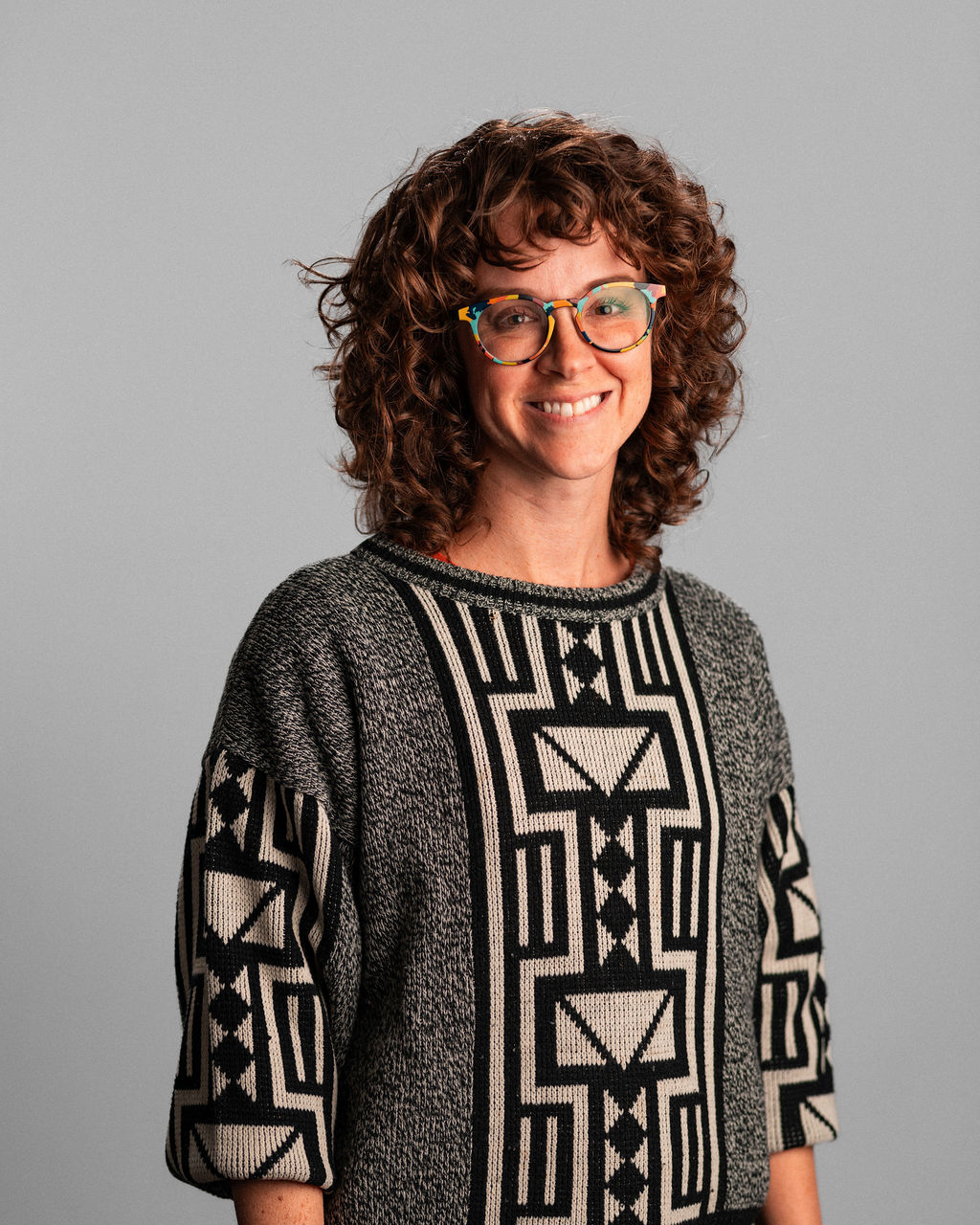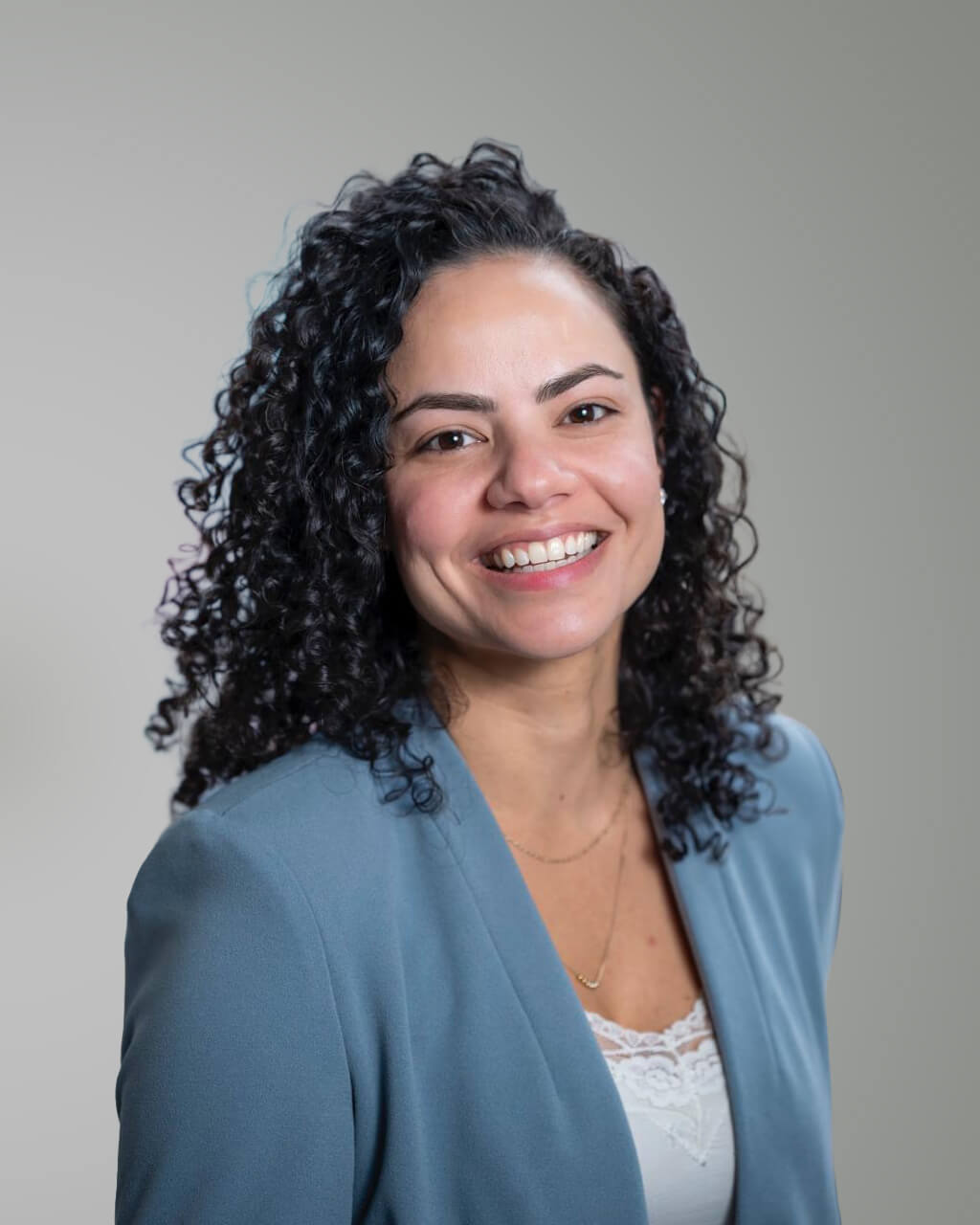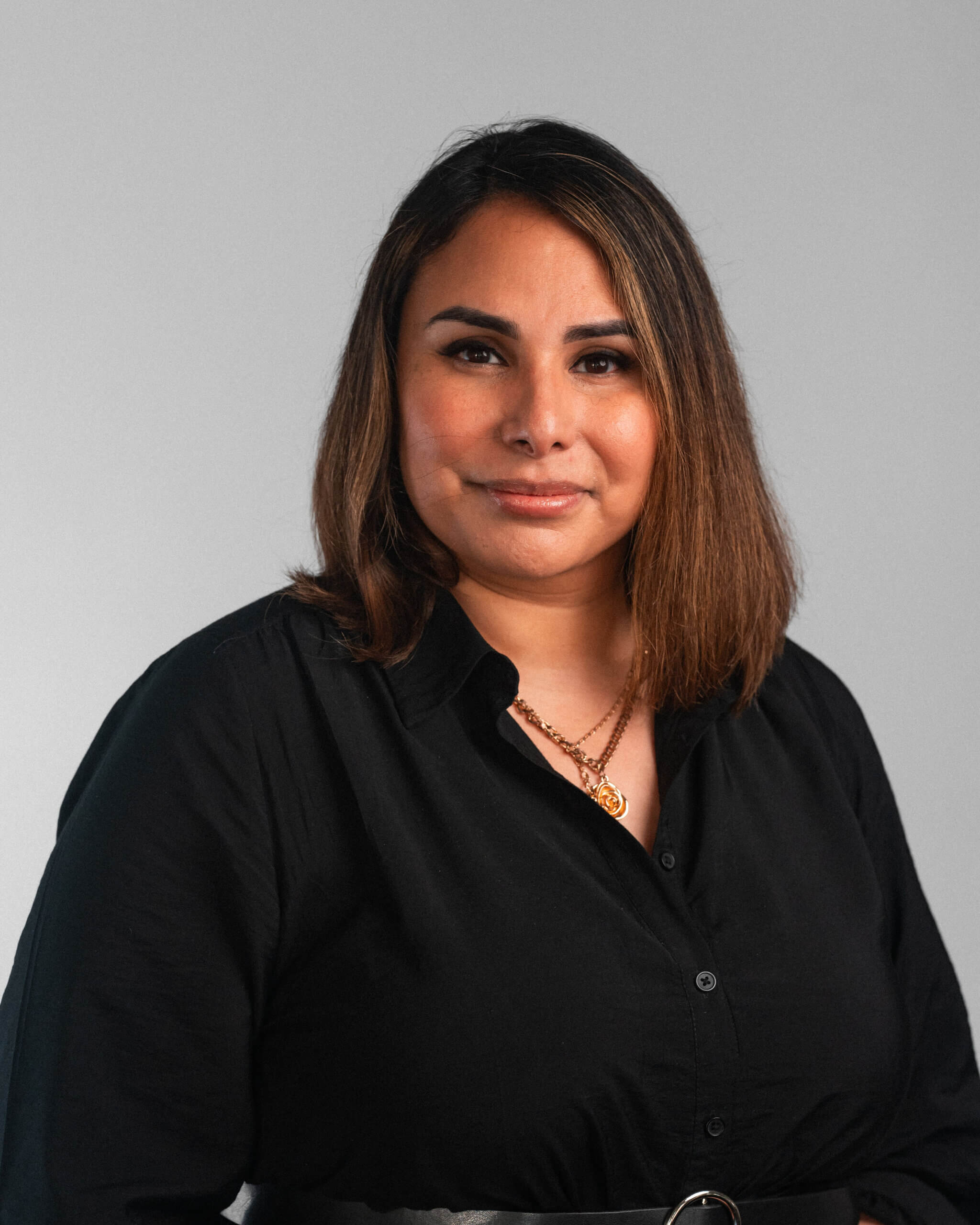
Master of Arts in Counseling: Clinical Mental Health Counseling
Chicago, Online
The Adler University Master of Arts in Counseling: Clinical Mental Health Counseling develops counselors to deliver accessible, effective care. This CACREP-accredited degree integrates theory, research, and supervised clinical training with Adlerian values, equipping graduates to support individuals and families while advancing healthier systems across communities locally and globally.
- 62 credits
- 2-year program, full-time study
- Licensure pathway
- Part-time opportunities
- In-person residency for online students
- Dual-degree, certificate + emphasis options
Admission Deadlines
| Term | Priority | Final |
|---|---|---|
| Fall 2026 | 12/1/2025 | 2/15/2026 |
| Summer 2026 | 2/15/2026 | 3/15/2026 |
Program overview
Demand for mental health counselors is increasing as communities seek greater access to effective, compassionate care. Graduates of Adler University’s clinical mental health counseling (CMHC) program are prepared to respond to this need, advancing mental health and well-being in health care, education, and community systems.
Through practicum and internship experiences, faculty mentorship, and small class settings, students develop licensure-ready skills to deliver effective care and address systemic barriers in the field of mental health.
Why choose the CMHC program at Adler University?
- Nationally accredited: The program is accredited by the Council for Accreditation of Counseling and Related Educational Programs (CACREP), ensuring the highest standards in counselor preparation.
- Career readiness: Graduates are prepared for licensure as professional counselors and for careers in community agencies, health care systems, schools, and private practice.
- Extensive clinical training: Chicago students complete more than 700 supervised clinical hours through practicum and internship placements, strengthened by community partnerships across one of the nation’s most diverse urban settings.
- Flexible online pathway: Engage in asynchronous coursework, live virtual sessions, and two immersive Chicago residencies designed to strengthen skills and build professional networks.
- Commitment to impact: Both Chicago and online students learn to provide culturally responsive care, grounded in Adlerian values of belonging and advocacy.
CMHC online
The CMHC program is offered in an interactive online modality designed for distance learners. Courses are delivered through the University’s learning management system, Canvas, in a format that balances structure with flexibility. Students may complete the program in as little as 2 years full time, with additional options for 2.5- or 3-year course plans.
Courses also incorporate required synchronous sessions via Zoom or Teams, typically held every other week for about an hour. These meetings provide opportunities for experiential practice and connection with peers and faculty; some are optional unless specified by the instructor.
In addition, four courses require face-to-face learning during two, four-day residencies at Adler’s Chicago Campus. Residency dates typically occur in early late October/early November and mid-March of each academic year.
Residencies strengthen clinical skills while fostering meaningful connections with classmates and professors:
First residency:
- Counseling skills.
- Counseling multicultural communities.
Second residency:
- Group counseling.
- Treatment planning and intervention.
LICENSURE
Many states accept CACREP-accredited programs as meeting the educational requirements for entry-level counselor licensure. Graduates of both campus and online modalities may apply for licensure in these states. Licensure criteria vary and change frequently, so students must verify requirements for the state where they plan to practice. Additional coursework may be necessary in some cases, and students can often use electives to meet these requirements.
Licensed Professional Counselor (LPC)
Licensed Professional Counselors (LPC), Licensed Clinical Professional Counselors (LCPC), Licensed Mental Health Counselors (LMHC) (acronyms are state dependent) provide individual, group, and family therapy in diverse settings such as community agencies, hospitals, schools, and private practice. They assess mental health needs, develop treatment plans, and offer evidence-based interventions. LPCs play a crucial role in supporting clients through life challenges, trauma, and mental health disorders, promoting emotional well-being and resilience.
National Certified Counselor (NCC)
Graduates of the program are also eligible to take part in the National Certified Counselor (NCC) credential, after successful passage of the National Counselor Examination (NCE) and completion of required experiences.
Expand Your Credentials
Adler University provides students with options to customize their education through dual degrees, certificates, and program emphases.
Dual degree programs are available for students studying in Chicago, allowing them to pursue two fields of study simultaneously — combining complementary skill sets, expanding professional networks, and opening up new career opportunities. In-person learners may also add a certificate to further specialize their expertise, gaining focused training that complements their primary degree.
In both Chicago and online, students in the Clinical Mental Health Counseling program may choose an emphasis area, tailoring coursework to align with specific interests and career goals. Together, these options create pathways to customize an education that supports long-term aspirations.
The Clinical Mental Health Counseling (CMHC) master’s program offers students the chance to specialize in a specific area of counseling through the Military and Veterans Behavioral Health (MVBH) emphasis.
Accredited by CACREP, CMHC provides a robust foundation in counseling, and with the MVBH focus, students gain the expertise to meet the demand for professionals who understand the complexities of military culture and mental health needs. The program covers the unique behavioral and social issues affecting this community, while also training students to approach these concerns with cultural competence and sensitivity.
This specialized track dives into the distinct challenges faced by military personnel, veterans, and their families, equipping students with the knowledge to navigate issues ranging from trauma to reintegration. Graduates leave with the practical skills to address these concerns effectively in a variety of professional settings, from military institutions to government and private sector roles.
Careers
With a national workforce shortage and growing demand for professionals skilled in military cultural competence, Adler University’s program plays a crucial role in addressing this need while supporting the well-being of military service members, veterans, and their families. Graduates are prepared to pursue roles in various sectors, including federal, state, and local agencies, as well as academia and private practice. Potential career opportunities include:
- Licensed Clinical Professional Counselor (LCPC) in Veterans Administration Medical Centers or Vet Centers.
- Student Veterans Support Counselor in college or university settings.
- Clinical Professional Counselor in Veterans Court Programs.
- Veterans Employment Counselor.
Application process
All students admitted to the CMHC program are eligible to pursue this emphasis. After starting the program, those who choose to add it must submit a request to the Office of the Registrar. Once processed, they may register for emphasis courses.
Adler University offers a Substance Abuse Counseling Certificate to students in select Chicago programs through an additional 12 credit hours.
The certificate is accredited as an Advanced Alcohol and Other Drug Abuse Counselor Training Program by the Illinois Alcohol and Other Drug Abuse Professional Certification Association, Inc. (IAODAPCA), following the Illinois Model for Certification of Alcohol and Other Drug Abuse Counselors.
Coursework covers the theories, techniques, and core functions of substance abuse counseling, with an emphasis on evidence-based research and best practice standards. A specialized practicum experience further enhances applied skills and professional preparation.
Redefine performance with a dual degree that unites sport psychology and clinical counseling.
Adler University’s Master of Science (M.S.) in Sport and Human Performance combined with the Master of Arts (M.A.) in Clinical Mental Health Counseling prepares graduates to support clients across the spectrum — from those navigating chronic mental illness to athletes striving for peak performance, while leveraging sport as a platform for broader change. The program integrates clinical mental health training with advanced performance psychology, equipping students to drive impact across health care, athletics, and community settings.
Shape the future of mental health with a dual degree that merges clinical counseling with forensic leadership.
The Master of Arts (M.A.) in Forensic Mental Health Leadership combined with the Master of Arts (M.A.) in Clinical Mental Health Counseling positions graduates at the intersection of psychology and justice, ready to guide change across communities, systems, and correctional settings. Students gain the expertise to assess, treat, consult, and lead, opening doors to dynamic careers in both traditional mental health care and the criminal justice system.
Clinical Mental Health Counseling Careers That support healing
Grounded in theory and enriched by direct clinical experience, Adler’s clinical mental health counseling program opens doors to careers across a variety of settings, including roles such as:

Licensed Professional Counselor
Licensed Professional Counselors (LPC), Licensed Clinical Professional Counselors (LCPC), Licensed Mental Health Counselors (LMHC) (acronyms are state dependent) provide individual, group, and family therapy in diverse settings such as community agencies, hospitals, schools, and private practice. They assess mental health needs, develop treatment plans, and offer evidence-based interventions. LPCs play a crucial role in supporting clients through life challenges, trauma, and mental health disorders, promoting emotional well-being and resilience.

Community Mental Health Advocate + Program Leader
Graduates often lead community-based initiatives to improve access to mental health services for underserved populations. Mental Health Program Leaders work with nonprofits, advocacy groups, and public agencies to design and implement culturally responsive programs, promote social justice, and influence policies that address systemic barriers. Their work fosters equity and strengthens community resilience.

Trauma + Crisis Intervention Specialist
Specializing in trauma recovery, these counselors provide immediate and ongoing support to individuals affected by crisis, abuse, or disaster. Trauma and Crisis Intervention Specialists employ evidence-based, trauma-informed approaches to assist clients in processing their experiences and rebuilding their lives. This role often involves collaboration with healthcare providers, law enforcement, and social services to ensure comprehensive care.

Integrated Behavioral Health Counselor
Integrated Behavioral Health Counselors work within primary care or medical settings, collaborating with healthcare teams to address patients’ mental, emotional, and behavioral health needs. They provide brief, targeted interventions that improve overall health outcomes, bridging the gap between physical and mental healthcare while promoting holistic, patient-centered treatment plans.
*Data is from the 2024 Occupational Outlook Handbook from the Bureau of Labor Statistics
Admissions requirements
Eligibility
- Applicants must hold a bachelor’s degree from a regionally accredited or an equivalent degree from an international college or university.
- A recommended GPA of 3.0 or higher on a 4.0 scale for undergraduate and graduate coursework. Exceptions may be made for applicants who demonstrate outstanding academic performance or academic ability in other ways.
- Approved applicants will be invited for a personal interview as the final step in the application process.
Application Requirements
Applicants must submit the following materials for admission consideration:
- Application fee.
- Completed application submitted via the online portal.
- Resume or Curriculum Vitae
- Statement of Intent.
- Official transcripts from all undergraduate and graduate schools attended (U.S. and Canada). International transcripts must be evaluated by a transcript evaluation service.
- Two letters of recommendation. These should be from someone who can specifically speak to your academic and professional abilities.
- Faculty interview.
Statement of Intent
Applicants are required to provide a statement of intent answering the following questions. They should be 2-3 pages, double-spaced.
- Why are you interested in your chosen field and program?
- Why is Adler University’s program a good fit for you?
- Adler University anchors students in the scholarship of Alfred Adler — a deep sense of social interest and mutual responsibility. Please share your perspective on social interest and what it means to you.
- What are your career goals and interests?
How to Apply + Submit Transcripts
- Complete your application in Adler University’s online portal. The application, fee, Statement of Intent, resume/CV, and references’ details are submitted in the portal.
- Official transcripts must be sent directly from each issuing institution or approved service to the Office of Admissions prior to the application deadline. Do not upload official copies to the portal.
Unofficial transcripts may be accepted for any schools in which a degree was not received.
Adler University – Office of Admissions
17 N. Dearborn Street
Chicago, IL 60602
Official electronic transcripts should be sent to admissions@adler.edu.
Program milestones
Gain CACREP-accredited training, complete 700+ clinical hours, and graduate ready for licensure and a meaningful careers in mental health.
Phase 1: Foundational Coursework + Community Practicum
Build a strong foundation in counseling theories, ethics, counseling skills, multicultural counseling, and Adlerian psychology, then apply your learning through the Social Justice Practicum (SJP), a 200-hour supervised non-clinical practicum that develops essential counseling skills.

Phase 2: Advanced Coursework, Electives + Internship
Engage in advanced coursework in trauma, group counseling, assessment, and Adlerian theory, select elective focus areas, and complete a 700-hour practicum and internship that provides direct client experience, supervision, and real-world practice.

Phase 3: Capstone + Licensure Prep
Demonstrate your learning through your comprehensive exam, positioning you for state licensure upon graduation (or equivalent credentials based on your location).

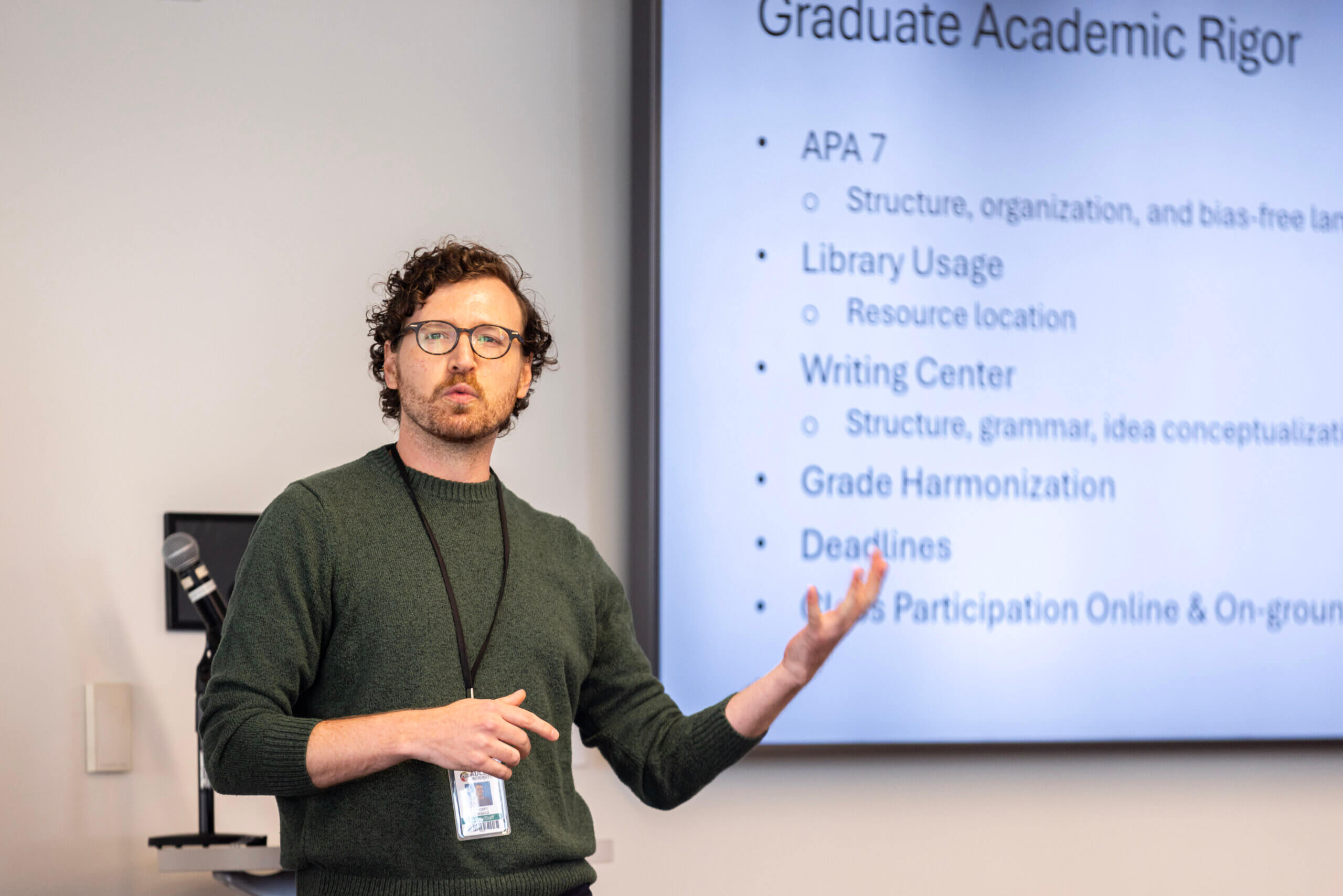
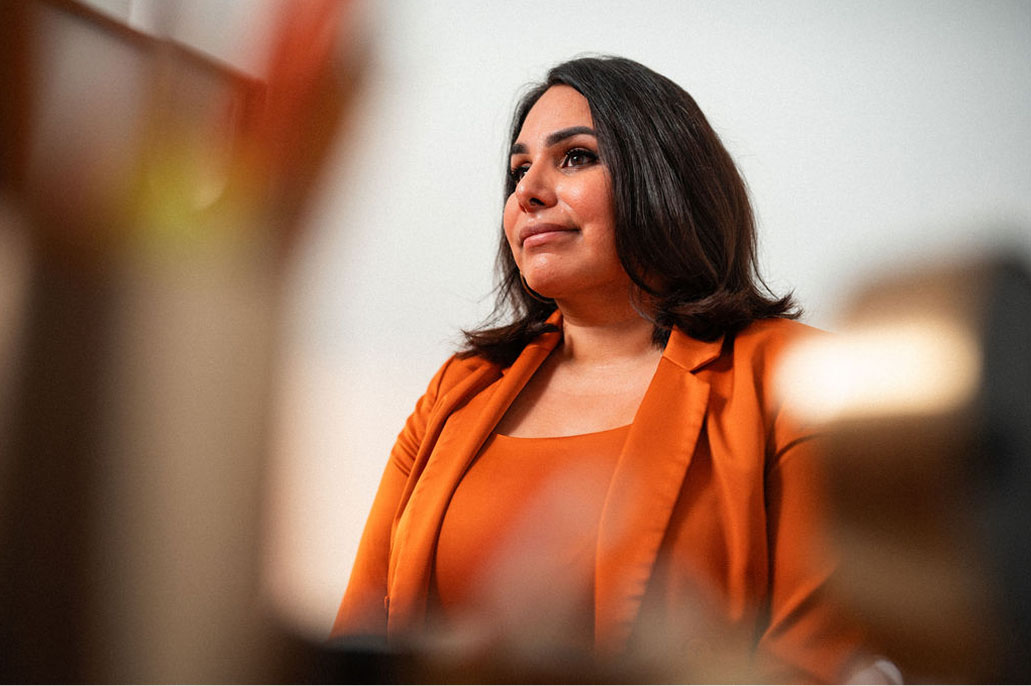
Curriculum | Internships | practicums
The Master of Arts in Clinical Mental Health Counseling is a 62-credit-hour program that combines counseling training with a range of coursework. Completion of the program includes the courses below, along with additional requirements outlined in the Adler University catalog.
CORE COURSES
In alignment with CACREP standards, the CMHC program offers core coursework in the following 8 areas: Professional Orientation and Ethics, Social and Cultural Diversity, Human Growth and Development, Career Development, Group work, Counseling Relationships, Research, and Assessment.
Adlerian Theory and Counseling
This course introduces the principles of Alfred Adler’s theory as a basis for understanding the development of an individual’s unique style of living or personality. These principles include the purposiveness of behavior, the indivisible self, goal-directed behavior, and the role of social interest in mental health and social progress.
Professional Functions of Clinical Mental Health Counselors
This course orients students to the roles and functions of clinical mental health counselors. Topics include the nature and history of the field of clinical mental health counseling, the function of care coordination across different service delivery formats, as well as the policies and regulations that impact counselors.
Professional, Legal, and Ethical Issues
This course provides a foundation for the ethical practice of professional counseling. It introduces students to the history of the counseling profession as well as professional roles (practitioner, supervisor, educator, etc.) and professional organizations.
Diagnosis Maladaptive Behavior
This course provides an overview of the major disorders in the current edition of the DSM. A range of mental disorders from adjustment disorders to serious psychopathologies will be discussed.
Multicultural and Social Justice Counseling
This course is designed to provide a basic foundation of knowledge, awareness, and skills needed for providing more effective counseling services in a multicultural society.
Treatment Planning and Intervention
This course is designed to assist students in expanding their counseling knowledge and skills. Students will learn to formulate treatment goals and intervention strategies integrating theory, assessment, and diagnostic information for a variety of client problems, including assessing and managing suicidal risk and crisis intervention.
Couples and Family Counseling
This course presents an overview of major models of couples and family therapy. The impact of multigenerational and environment factors on family dynamics and couples’ relations will be examined through various systemic perspectives.
Research and Program Evaluation
This course is a master’s-level introduction to research methods and program evaluation as it pertains to the field of professional counseling. Major research designs including both quantitative and qualitative methods will be explored.
Appraisal and Assessment
This course will provide foundational knowledge of individual and group approaches to assessment and evaluation commonly used in counseling practice. Students will be introduced to a variety of formal and informal assessment tools and instruments.
Career Development Theories and Interventions
This course will examine career development and decision-making models and ethical counseling applications to diverse/multicultural client populations. Students will select, administer, interpret, and evaluate a variety of assessment instruments (online, etc.) and utilize educational and labor market information for the purpose of career planning and development.
Addiction Counseling
This course provides an introduction to substance use and the treatment of addictive disorders. Assessment of substance use disorders and current treatment models for substance use, misuse, abuse, dependence, and concurrent disorders are discussed.
Crisis Intervention and Trauma Counseling
This course will introduce students to crisis intervention models and associated responses to clients’ mental health needs during crises, disasters, and other trauma-causing events. Strategies and procedures for assessing risk, including suicide, aggression, and self-harm will also be covered.
ELECTIVES
CMHC students complete at least one three-credit elective as part of the program. Electives may be chosen from those offered within the Clinical Mental Health Counseling program or from the broader counseling curriculum, with faculty advisor approval.
Elective availability varies by term and format, so not all courses are offered every semester or in both online and on-campus modalities. Canadian students planning to pursue doctoral studies are encouraged to select the three-course thesis series, which fulfills the elective requirement.
Examples of electives include:
Preparation for Applied Thesis
The purpose of this course is to review policies and procedures pertinent to completion of a thesis as a degree program requirement. The course instructor will assist students in selecting and/or refining an appropriate topic for empirical study, identifying a faculty member to serve as their thesis advisor, identifying a second reader, and developing a research proposal that will form the foundation for their final thesis.
*Part of Thesis Series
M. A. Thesis I
The M.A. Thesis is a student-directed study conducted in consultation with an approved faculty member in a theoretical, methodological, or applied psychological area relevant to the curriculum.
*Part of Thesis Series
M. A. Thesis II
The M.A. Thesis is a student-directed study conducted in consultation with an approved faculty member in a theoretical, methodological, or applied psychological area relevant to the curriculum.
*Part of Thesis Series
Child and Adolescent Counseling
Counseling Older Adults and Families
Animal Assisted Therapy
Bio-Psycho-Social-Spiritual Aspects of Addictions
Advanced Adlerian Theory and Practice
Psychopharmacology in Counseling
Introduction to Play Therapy
SOCIAL JUSTICE PRACTICUM
Your opportunity to create lasting change on local and global systems, almost from day 1.
The Social Justice Practicum (SJP) at Adler University is a first-year non-clinical, community-based experience that reflects Alfred Adler’s concept of social interest. The practicum places students with mission-driven organizations where they complete a minimum of 200 approved hours across two semesters, typically 8-10 hours per week. Alongside their placements, students participate in required workshops. Each practicum is evaluated through midterm and final supervisor reviews, student self-assessments, and feedback on the site and project, with grades of High Pass, Pass, Remediation, or Fail. The experience culminates in a campus-wide presentation of outcomes, assessed by multiple evaluators, offering students both applied training and the opportunity to contribute to meaningful community change.
CLINICAL PRACTICUM + INTERNSHIP
All students enrolled in the CMHC program must complete the Social Justice Practicum, a 100-hour clinical practicum experience and a 600-hour clinical internship located at an external site.
CMHC Practicum and Seminar
CHMC Practicum provides a forum for students to attain supervised clinical experience in which the students develop basic counseling skills and integrate professional knowledge. Practicum requires students to complete 100 hours of field training in a clinical mental health setting, including attaining 40 direct hours through both individual and group counseling.
CMHC Internship and Seminar I
Following completion of practicum, internship is a supervised capstone clinical experience in which the student refines basic counseling and integrates and authenticates professional knowledge and skills appropriate to the clinical mental health counseling settings and initial postgraduate professional placement.
CMHC Internship and Seminar II
This is a continuation of students’ internship experience with the goal to complete the 600-hour requirement. At the conclusion of both the practicum and internship, students should be able to demonstrate competencies that enable them to be clinically and culturally competent, ethical, and socially responsible entry-level practitioners.
COMPREHENSIVE EXAM
CMHC Comprehensive Exam
The CMHC Comprehensive Examination evaluates general knowledge as a professional counselor. Included in this exam is an assessment of the student’s understanding of theoretical knowledge across a range of core subject areas found in the student’s curriculum.
MILITARY + VETERANS’ BEHAVIORAL HEALTH EMPHASIS CURRICULUM
A total of six credits are required to complete the emphasis. Students must take War, Trauma, Grief, Death, and Loss and select one additional course from the options below:
The Psychology of Conflict and Operations Other than War
Introduction to the concepts, goals, strategies, ideologies, and psychological theories associated with terrorism and operations other than war (e.g. disaster relief, peace keeping and enforcement). Emphasis will be placed on terrorist motives and on how terrorist actions have affected the course of history and current national and global policies.
Culture and Diversity in the Military
An overview of psychological and sociological dimensions of the warrior culture. In doing so the student will learn to assess research and develop a literature review on a specific area of military culture.
Continuum of Care for the Military, Veterans, and Their Families
Examine the social service and behavioral health systems that are responsible for providing psychiatric, mental health, substance abuse, and family care for those who are serving, or have served, and their families. This course will also promote an understanding of promising, best, and evidence-based practices in suicide prevention, mental health, and substance use treatment.
SUBSTANCE ABUSE COUNSELING CERTIFICATE CURRICULUM
The Certificate in Substance Abuse Counseling requires the following 12 credits of coursework.
Students will take one of the following:
Introduction to Addictive Disorders | PCO 438
Provides an introduction to alcoholism, substance abuse, and other addictive disorders. It includes an overview of assessment methodologies, the treatment models of addictive disorders, and the tools for recognizing the signs and symptoms of substance use, misuse, abuse, dependence, dual disorders, and mentally ill substance abusers.
Addictions Counseling
This course provides an introduction to substance use and the treatment of addictive disorders. Assessment of substance use disorders and current treatment models for substance use, misuse, abuse, dependence, and concurrent disorders are discussed.
Diagnosis and Treatment of Addictive Disorders
This course is designed to provide an introduction to alcoholism, substance abuse, and other addictive disorders. Included is an overview of the information needed to assess along with the treatment models of addictive disorders.
Introduction to Addictive Disorders | MCFT 538
This course is designed to provide an introduction to alcoholism, substance abuse, and other addictive disorders and an understanding of the impact of addiction on couples and families.
Students will also take one of the following:
Professional Development, Issues, and Ethics in Art Therapy
System Ethics
This course provides students with a solid foundation for the ethical practice of therapy with couples, families, and individuals in accordance with the Code of Ethics of the American Association for Marriage and Family Therapy (AAMFT).
Professional, Legal, and Ethics Issues
This course provides a foundation for the ethical practice of professional counseling. It introduces students to the history of the counseling profession as well as professional roles (practitioner, supervisor, educator, etc.) and professional organizations.
Ethics and Professional Development in Clinical Psychology
This course is designed to provide students with a solid foundation for the ethical practice of professional psychology. Students will learn the American Psychological Association Ethical Principles of Psychologists and Code of Conduct as well as the history of professional psychology and psychotherapy.
Students will also take one of the following:
Bio-Psycho-Social-Spiritual Aspects of Addictions | CSAC 889
Biological, neurological, and cognitive neuroscientific aspects of addictions are covered in the context of social, interpersonal, sociocultural, family, community, economic, and environmental dynamics. The psychological aspects of addictions are also addressed in relation to the aforementioned contexts, as well as psycho-spiritual and spiritual perspectives.
This course has prerequisites.
Bio-Psycho-Social-Spiritual Aspects of Addictions | PSY 712
Major theories of etiology, social dynamics, and psychology of alcohol and other drug disorders are presented within the context of human development. Clinical research is reviewed, which enhances a further understanding of the basic physiological, psychological, social, and spiritual aspects. Impact on the individual, family, community, and organizations/systems is presented.
Students will also take one of the following:
Advanced Addictions Treatment
Advances and deepens the degree of understanding of theoretical models and research related to addictions counseling. The areas of application include addictive behaviors, alcohol and substance abuse, etiology of addiction, and dual diagnosis and comorbidity.
This course has prerequisites.
Advanced Treatment of Addictive Disorders
Advances and deepens the degree of understanding of theoretical models and research related to addictions counseling. The areas of application include addictive behaviors, alcohol and substance abuse, etiology of addiction, and dual diagnosis and comorbidity.
SPECIALIZED PRACTICUM
In addition to the specialized coursework, students pursuing the Certificate in Substance Abuse Counseling will acquire and develop practical skills in the Alcohol and Other Drug Abuse (AODA) core functions through specialized field placements. The Certificate in Substance Abuse Counseling requires the following four semester credit hours of practicum and two substance abuse counseling practicum and seminar courses.
“Our students come here because they want to make a real difference. This program gives them the clinical skills and the social justice lens to do just that — to show up for communities that are often overlooked.”
Karyna S. Strickland, Ph.D., LPC, CSC
Program director, CMHC Chicago

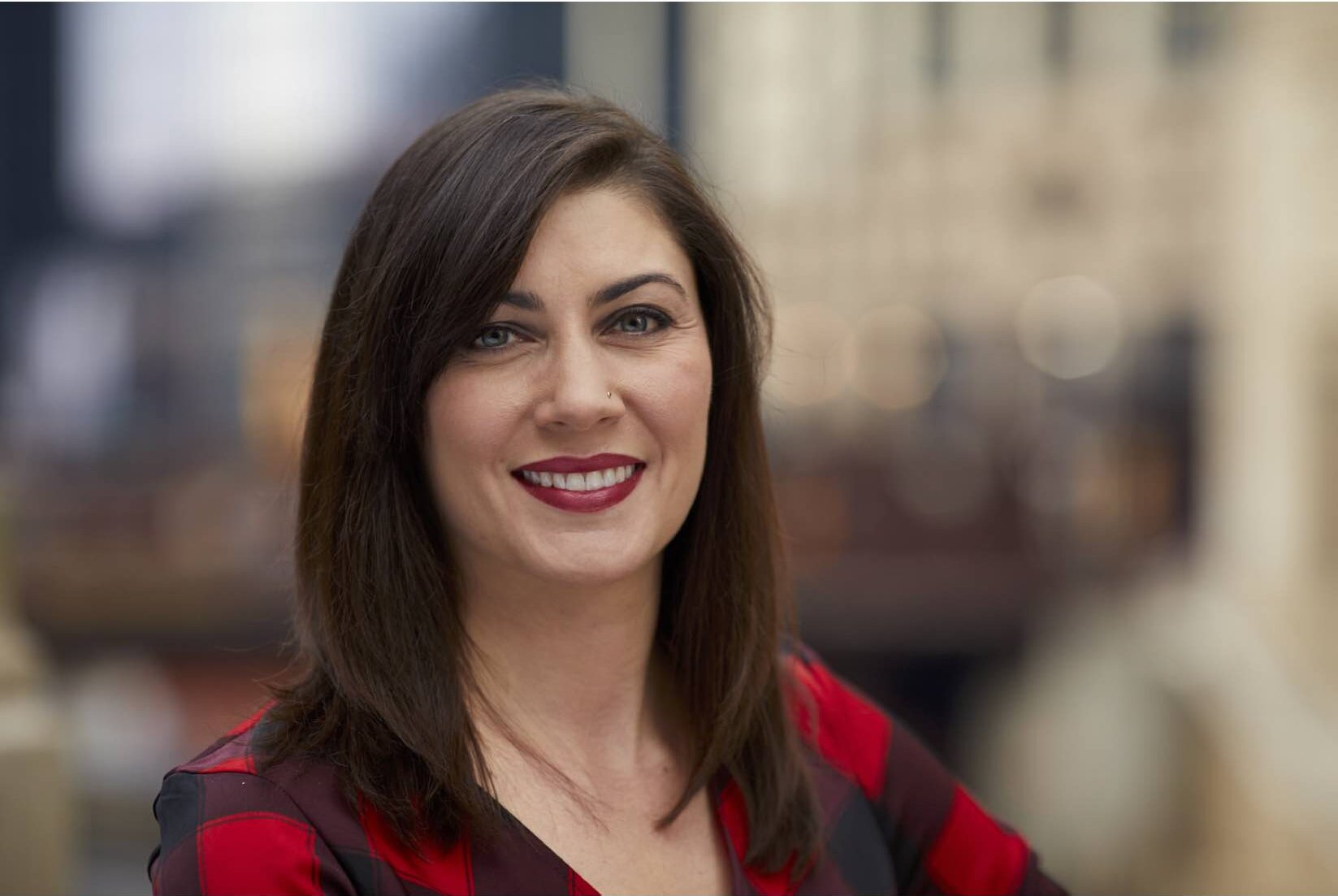
“Our CMHC Program provides you with the tools to directly impact people you work with, and generations from now by helping reduce generational trauma, heal emotional wounds, and learn to better cope with internal and external stressors. All while learning how to ethically diagnose and treat various, clinically significant mental health conditions.”
Jennifer Bonino Sobol, Ph.D.
Program director, CMHC online
Faculty
Meet the faculty leading Adler’s clinical mental health counseling master’s program.
Jennifer Bonino Sobol, Ph.D.
Program Director + Assistant Professor
Clinical Mental Health Counseling
Mtisunge Kapalamula, Ph.D., LCPC, LMHC
Assistant Professor
Clinical Mental Health Counseling
Lauren Melamed, Ph.D.
Director of Training + Associate Professor
Clinical Mental Health Counseling
Reylla Santos, Ph.D.
Assistant Professor
Master of Arts in Counseling: Clinical Mental Health Counseling
Karyna Strickland, Ph.D.
Program Director + Assistant Professor
Clinical Mental Health Counseling

Financing your degree
Use our tuition calculator to help you start to plan your budget. Financial aid from the government, scholarships, or part-time employment can help you more easily afford your degree.
Please make a selection using the filters above.
Art Therapy | Ph.D.
Year
1Credits
35Tuition
$35,035Fees
$3,222Total
$38,257Term
FallCredits
12Tuition
$12,012Fees
$1,074Total
$13,086Term
SpringCredits
12Tuition
$12,012Fees
$1,074Total
$13,086Term
SummerCredits
11Tuition
$11,011Fees
$1,074Total
$12,085Art Therapy | Ph.D.
Year
2Credits
18Tuition
$18,018Fees
$3,222Total
$21,240Term
FallCredits
9Tuition
$9,009Fees
$1,074Total
$10,083Term
SpringCredits
7Tuition
$7,007Fees
$1,074Total
$8,081Term
SummerCredits
2Tuition
$2,002Fees
$1,074Total
$3,076Art Therapy | Ph.D.
Year
3Credits
9Tuition
$9,009Fees
$3,222Total
$12,231Term
FallCredits
3Tuition
$3,003Fees
$1,074Total
$4,077Term
SpringCredits
3Tuition
$3,003Fees
$1,074Total
$4,077Term
SummerCredits
3Tuition
$3,003Fees
$1,074Total
$4,077Art Therapy | Ph.D.
Year
1Credits
35Tuition
$35,035Fees
$7,428Total
$42,463Term
FallCredits
12Tuition
$12,012Fees
$2,476Total
$14,488Term
SpringCredits
12Tuition
$12,012Fees
$2,476Total
$14,488Term
SummerCredits
11Tuition
$11,011Fees
$2,476Total
$13,487Art Therapy | Ph.D.
Year
2Credits
18Tuition
$18,018Fees
$7,428Total
$25,446Term
FallCredits
9Tuition
$9,009Fees
$2,476Total
$11,485Term
SpringCredits
7Tuition
$7,007Fees
$2,476Total
$9,483Term
SummerCredits
2Tuition
$2,002Fees
$2,476Total
$4,478Art Therapy | Ph.D.
Year
3Credits
9Tuition
$9,009Fees
$7,428Total
$16,437Term
FallCredits
3Tuition
$3,003Fees
$2,476Total
$5,479Term
SpringCredits
3Tuition
$3,003Fees
$2,476Total
$5,479Term
SummerCredits
3Tuition
$3,003Fees
$2,476Total
$5,4794 Year Course Sequence (on ground)
Clinical Mental Health Counseling | M.A.
Year
1Credits
18Tuition
$29,106Fees
$1,806Total
$30,912Term
FallCredits
6Tuition
$9,702Fees
$602Total
$10,304Term
SpringCredits
6Tuition
$9,702Fees
$602Total
$10,304Term
SummerCredits
6Tuition
$9,702Fees
$602Total
$10,304Clinical Mental Health Counseling | M.A.
Year
2Credits
20Tuition
$32,340Fees
$1,806Total
$34,146Term
FallCredits
7Tuition
$11,319Fees
$602Total
$11,921Term
SpringCredits
7Tuition
$11,319Fees
$602Total
$11,921Term
SummerCredits
6Tuition
$9,702Fees
$602Total
$10,304Clinical Mental Health Counseling | M.A.
Year
3Credits
18Tuition
$29,106Fees
$1,806Total
$30,912Term
FallCredits
6Tuition
$9,702Fees
$602Total
$10,304Term
SpringCredits
6Tuition
$9,702Fees
$602Total
$10,304Term
SummerCredits
6Tuition
$9,702Fees
$602Total
$10,304Clinical Mental Health Counseling | M.A.
Year
4Credits
6Tuition
$9,702Fees
$1,806Total
$11,508Term
FallCredits
2Tuition
$3,234Fees
$602Total
$3,836Term
SpringCredits
2Tuition
$3,234Fees
$602Total
$3,836Term
SummerCredits
2Tuition
$3,234Fees
$602Total
$3,8364 Year Course Sequence (on ground)
Clinical Mental Health Counseling | M.A.
Year
1Credits
18Tuition
$29,106Fees
$6,012Total
$35,118Term
FallCredits
6Tuition
$9,702Fees
$2,004Total
$11,706Term
SpringCredits
6Tuition
$9,702Fees
$2,004Total
$11,706Term
SummerCredits
6Tuition
$9,702Fees
$2,004Total
$11,706Clinical Mental Health Counseling | M.A.
Year
2Credits
20Tuition
$32,340Fees
$6,012Total
$38,352Term
FallCredits
7Tuition
$11,319Fees
$2,004Total
$13,323Term
SpringCredits
7Tuition
$11,319Fees
$2,004Total
$13,323Term
SummerCredits
6Tuition
$9,702Fees
$2,004Total
$11,706Clinical Mental Health Counseling | M.A.
Year
3Credits
18Tuition
$29,106Fees
$6,012Total
$35,118Term
FallCredits
6Tuition
$9,702Fees
$2,004Total
$11,706Term
SpringCredits
6Tuition
$9,702Fees
$2,004Total
$11,706Term
SummerCredits
6Tuition
$9,702Fees
$2,004Total
$11,706Clinical Mental Health Counseling | M.A.
Year
4Credits
6Tuition
$9,702Fees
$6,012Total
$15,714Term
FallCredits
2Tuition
$3,234Fees
$2,004Total
$5,238Term
SpringCredits
2Tuition
$3,234Fees
$2,004Total
$5,238Term
SummerCredits
2Tuition
$3,234Fees
$2,004Total
$5,2383 Year Course Sequence (on ground)
Clinical Mental Health Counseling | M.A.
Year
1Credits
24Tuition
$38,808Fees
$1,806Total
$40,614Term
FallCredits
9Tuition
$14,553Fees
$602Total
$15,155Term
SpringCredits
9Tuition
$14,553Fees
$602Total
$15,155Term
SummerCredits
6Tuition
$9,702Fees
$602Total
$10,304Clinical Mental Health Counseling | M.A.
Year
2Credits
23Tuition
$37,191Fees
$1,806Total
$38,997Term
FallCredits
7Tuition
$11,319Fees
$602Total
$11,921Term
SpringCredits
7Tuition
$11,319Fees
$602Total
$11,921Term
SummerCredits
9Tuition
$14,553Fees
$602Total
$15,155Clinical Mental Health Counseling | M.A.
Year
3Credits
18Tuition
$29,106Fees
$1,806Total
$30,912Term
FallCredits
6Tuition
$9,702Fees
$602Total
$10,304Term
SpringCredits
6Tuition
$9,702Fees
$602Total
$10,304Term
SummerCredits
6Tuition
$9,702Fees
$602Total
$10,3043 Year Course Sequence (on ground)
Clinical Mental Health Counseling | M.A.
Year
1Credits
24Tuition
$38,808Fees
$6,012Total
$44,820Term
FallCredits
9Tuition
$14,553Fees
$2,004Total
$16,557Term
SpringCredits
9Tuition
$14,553Fees
$2,004Total
$16,557Term
SummerCredits
6Tuition
$9,702Fees
$2,004Total
$11,706Clinical Mental Health Counseling | M.A.
Year
2Credits
23Tuition
$37,191Fees
$6,012Total
$43,203Term
FallCredits
7Tuition
$11,319Fees
$2,004Total
$13,323Term
SpringCredits
7Tuition
$11,319Fees
$2,004Total
$13,323Term
SummerCredits
9Tuition
$14,553Fees
$2,004Total
$16,557Clinical Mental Health Counseling | M.A.
Year
3Credits
18Tuition
$29,106Fees
$6,012Total
$35,118Term
FallCredits
6Tuition
$9,702Fees
$2,004Total
$11,706Term
SpringCredits
6Tuition
$9,702Fees
$2,004Total
$11,706Term
SummerCredits
6Tuition
$9,702Fees
$2,004Total
$11,7062 Year Course Sequence (on ground)
Clinical Mental Health Counseling | M.A.
Year
1Credits
35Tuition
$56,595Fees
$1,806Total
$58,401Term
FallCredits
13Tuition
$21,021Fees
$602Total
$21,623Term
SpringCredits
13Tuition
$21,021Fees
$602Total
$21,623Term
SummerCredits
9Tuition
$14,553Fees
$602Total
$15,155Clinical Mental Health Counseling | M.A.
Year
2Credits
27Tuition
$43,659Fees
$1,806Total
$45,465Term
FallCredits
12Tuition
$19,404Fees
$602Total
$20,006Term
SpringCredits
9Tuition
$14,553Fees
$602Total
$15,155Term
SummerCredits
6Tuition
$9,702Fees
$602Total
$10,3042 Year Course Sequence (on ground)
Clinical Mental Health Counseling | M.A.
Year
1Credits
35Tuition
$56,595Fees
$6,012Total
$62,607Term
FallCredits
13Tuition
$21,021Fees
$2,004Total
$23,025Term
SpringCredits
13Tuition
$21,021Fees
$2,004Total
$23,025Term
SummerCredits
9Tuition
$14,553Fees
$2,004Total
$16,557Clinical Mental Health Counseling | M.A.
Year
2Credits
27Tuition
$43,659Fees
$6,012Total
$49,671Term
FallCredits
12Tuition
$19,404Fees
$2,004Total
$21,408Term
SpringCredits
9Tuition
$14,553Fees
$2,004Total
$16,557Term
SummerCredits
6Tuition
$9,702Fees
$2,004Total
$11,7063 Year Course Sequence (online)
Clinical Mental Health Counseling | M.A.
Year
1Credits
29Tuition
$46,893Fees
$1,806Total
$48,699Term
FallCredits
9.5Tuition
$15,362Fees
$602Total
$15,964Term
SpringCredits
9.5Tuition
$15,362Fees
$602Total
$15,964Term
SummerCredits
10Tuition
$16,170Fees
$602Total
$16,772Clinical Mental Health Counseling | M.A.
Year
2Credits
24Tuition
$38,808Fees
$1,806Total
$40,614Term
FallCredits
6Tuition
$9,702Fees
$602Total
$10,304Term
SpringCredits
9Tuition
$14,553Fees
$602Total
$15,155Term
SummerCredits
9Tuition
$14,553Fees
$602Total
$15,155Clinical Mental Health Counseling | M.A.
Year
3Credits
9Tuition
$14,553Fees
$1,806Total
$16,359Term
FallCredits
3 or 6Tuition
$4,851Fees
$602Total
$5,453Term
SpringCredits
3Tuition
$4,851Fees
$602Total
$5,453Term
SummerCredits
3Tuition
$4,851Fees
$602Total
$5,4533 Year Course Sequence (online)
Clinical Mental Health Counseling | M.A.
Year
1Credits
29Tuition
$46,893Fees
$6,012Total
$52,905Term
FallCredits
9.5Tuition
$15,362Fees
$2,004Total
$17,366Term
SpringCredits
9.5Tuition
$15,362Fees
$2,004Total
$17,366Term
SummerCredits
10Tuition
$16,170Fees
$2,004Total
$18,174Clinical Mental Health Counseling | M.A.
Year
2Credits
24Tuition
$38,808Fees
$6,012Total
$44,820Term
FallCredits
6Tuition
$9,702Fees
$2,004Total
$11,706Term
SpringCredits
9Tuition
$14,553Fees
$2,004Total
$16,557Term
SummerCredits
9Tuition
$14,553Fees
$2,004Total
$16,557Clinical Mental Health Counseling | M.A.
Year
3Credits
9Tuition
$14,553Fees
$6,012Total
$20,565Term
FallCredits
3 or 6Tuition
$4,851Fees
$2,004Total
$6,855Term
SpringCredits
3Tuition
$4,851Fees
$2,004Total
$6,855Term
SummerCredits
3Tuition
$4,851Fees
$2,004Total
$6,8552.5 Year Course Sequence (online)
Clinical Mental Health Counseling | M.A.
Year
1Credits
29Tuition
$46,893Fees
$1,806Total
$48,699Term
FallCredits
9.5Tuition
$15,362Fees
$602Total
$15,964Term
SpringCredits
9.5Tuition
$15,362Fees
$602Total
$15,964Term
SummerCredits
10Tuition
$16,170Fees
$602Total
$16,772Clinical Mental Health Counseling | M.A.
Year
2Credits
27Tuition
$43,659Fees
$1,806Total
$45,465Term
FallCredits
9Tuition
$14,553Fees
$602Total
$15,155Term
SpringCredits
9Tuition
$14,553Fees
$602Total
$15,155Term
SummerCredits
9Tuition
$14,553Fees
$602Total
$15,155Clinical Mental Health Counseling | M.A.
Year
3Credits
6Tuition
$9,702Fees
$1,204Total
$10,906Term
FallCredits
3Tuition
$4,851Fees
$602Total
$5,453Term
SpringCredits
3Tuition
$4,851Fees
$602Total
$5,4532.5 Year Course Sequence (online)
Clinical Mental Health Counseling | M.A.
Year
1Credits
29Tuition
$46,893Fees
$6,012Total
$52,905Term
FallCredits
9.5Tuition
$15,362Fees
$2,004Total
$17,366Term
SpringCredits
9.5Tuition
$15,362Fees
$2,004Total
$17,366Term
SummerCredits
10Tuition
$16,170Fees
$2,004Total
$18,174Clinical Mental Health Counseling | M.A.
Year
2Credits
27Tuition
$43,659Fees
$6,012Total
$49,671Term
FallCredits
9Tuition
$14,553Fees
$2,004Total
$16,557Term
SpringCredits
9Tuition
$14,553Fees
$2,004Total
$16,557Term
SummerCredits
9Tuition
$14,553Fees
$2,004Total
$16,557Clinical Mental Health Counseling | M.A.
Year
3Credits
6Tuition
$9,702Fees
$4,008Total
$13,710Term
FallCredits
3Tuition
$4,851Fees
$2,004Total
$6,855Term
SpringCredits
3Tuition
$4,851Fees
$2,004Total
$6,8552 Year Course Sequence (online)
Clinical Mental Health Counseling | M.A.
Year
1Credits
38Tuition
$61,446Fees
$1,806Total
$63,252Term
FallCredits
12.5Tuition
$20,213Fees
$602Total
$20,815Term
SpringCredits
12.5Tuition
$20,213Fees
$602Total
$20,815Term
SummerCredits
13Tuition
$21,021Fees
$602Total
$21,623Clinical Mental Health Counseling | M.A.
Year
2Credits
24Tuition
$38,808Fees
$1,806Total
$40,614Term
FallCredits
9Tuition
$14,553Fees
$602Total
$15,155Term
SpringCredits
9Tuition
$14,553Fees
$602Total
$15,155Term
SummerCredits
6Tuition
$9,702Fees
$602Total
$10,3042 Year Course Sequence (online)
Clinical Mental Health Counseling | M.A.
Year
1Credits
38Tuition
$61,446Fees
$6,012Total
$67,458Term
FallCredits
12.5Tuition
$20,213Fees
$2,004Total
$22,217Term
SpringCredits
12.5Tuition
$20,213Fees
$2,004Total
$22,217Term
SummerCredits
13Tuition
$21,021Fees
$2,004Total
$23,025Clinical Mental Health Counseling | M.A.
Year
2Credits
24Tuition
$38,808Fees
$6,012Total
$44,820Term
FallCredits
9Tuition
$14,553Fees
$2,004Total
$16,557Term
SpringCredits
9Tuition
$14,553Fees
$2,004Total
$16,557Term
SummerCredits
6Tuition
$9,702Fees
$2,004Total
$11,706Clinical Psychology | Psy.D.
Year
1Credits
36Tuition
$67,644Fees
$2,400Total
$70,044Term
FallCredits
13Tuition
$24,427Fees
$800Total
$25,227Term
SpringCredits
12Tuition
$22,548Fees
$800Total
$23,348Term
SummerCredits
11Tuition
$20,669Fees
$800Total
$21,469Clinical Psychology | Psy.D.
Year
2Credits
36Tuition
$67,644Fees
$2,400Total
$70,044Term
FallCredits
13Tuition
$24,427Fees
$800Total
$25,227Term
SpringCredits
13Tuition
$24,427Fees
$800Total
$25,227Term
SummerCredits
10Tuition
$18,790Fees
$800Total
$19,590Clinical Psychology | Psy.D.
Year
3Credits
25.5Tuition
$47,915Fees
$2,400Total
$50,315Term
FallCredits
10.5Tuition
$19,730Fees
$800Total
$20,530Term
SpringCredits
7.5Tuition
$14,093Fees
$800Total
$14,893Term
SummerCredits
7.5Tuition
$14,093Fees
$800Total
$14,893Clinical Psychology | Psy.D.
Year
4Credits
16.5Tuition
$31,004Fees
$2,400Total
$33,404Term
FallCredits
8.5Tuition
$15,972Fees
$800Total
$16,772Term
SpringCredits
4.5Tuition
$8,456Fees
$800Total
$9,256Term
SummerCredits
3.5Tuition
$6,577Fees
$800Total
$7,377Clinical Psychology | Psy.D.
Year
5Credits
0Tuition
$0Fees
$2,400Total
$2,400Term
FallCredits
0Tuition
$0Fees
$800Total
$800Term
SpringCredits
0Tuition
$0Fees
$800Total
$800Term
SummerCredits
0Tuition
$0Fees
$800Total
$800Clinical Psychology | Psy.D.
Year
1Credits
36Tuition
$67,644Fees
$6,606Total
$74,250Term
FallCredits
13Tuition
$24,427Fees
$2,202Total
$26,629Term
SpringCredits
12Tuition
$22,548Fees
$2,202Total
$24,750Term
SummerCredits
11Tuition
$20,669Fees
$2,202Total
$22,871Clinical Psychology | Psy.D.
Year
2Credits
36Tuition
$67,644Fees
$6,606Total
$74,250Term
FallCredits
13Tuition
$24,427Fees
$2,202Total
$26,629Term
SpringCredits
13Tuition
$24,427Fees
$2,202Total
$26,629Term
SummerCredits
10Tuition
$18,790Fees
$2,202Total
$20,992Clinical Psychology | Psy.D.
Year
3Credits
25.5Tuition
$47,915Fees
$6,606Total
$54,521Term
FallCredits
10.5Tuition
$19,730Fees
$2,202Total
$21,932Term
SpringCredits
7.5Tuition
$14,093Fees
$2,202Total
$16,295Term
SummerCredits
7.5Tuition
$14,093Fees
$2,202Total
$16,295Clinical Psychology | Psy.D.
Year
4Credits
16.5Tuition
$31,004Fees
$6,606Total
$37,610Term
FallCredits
8.5Tuition
$15,972Fees
$2,202Total
$18,174Term
SpringCredits
4.5Tuition
$8,456Fees
$2,202Total
$10,658Term
SummerCredits
3.5Tuition
$6,577Fees
$2,202Total
$8,779Clinical Psychology | Psy.D.
Year
5Credits
0Tuition
$0Fees
$6,606Total
$6,606Term
FallCredits
0Tuition
$0Fees
$2,202Total
$2,202Term
SpringCredits
0Tuition
$0Fees
$2,202Total
$2,202Term
SummerCredits
0Tuition
$0Fees
$2,202Total
$2,202Clinical Psychology | Psy.D.
Year
1Credits
42Tuition
$56,574Fees
$2,140Total
$58,714Term
FallCredits
15Tuition
$20,205Fees
$1,060Total
$21,265Term
SpringCredits
14Tuition
$18,858Fees
$540Total
$19,398Term
SummerCredits
13Tuition
$17,511Fees
$540Total
$18,051**Student Care is a student led health care plan and rates are likely to change each year; opt out with proof of other insurance is available
Clinical Psychology | Psy.D.
Year
2Credits
24Tuition
$32,328Fees
$2,140Total
$34,468Term
FallCredits
8Tuition
$10,776Fees
$1,060Total
$11,836Term
SpringCredits
8Tuition
$10,776Fees
$540Total
$11,316Term
SummerCredits
8Tuition
$10,776Fees
$540Total
$11,316**Student Care is a student led health care plan and rates are likely to change each year; opt out with proof of other insurance is available
Clinical Psychology | Psy.D.
Year
3Credits
20Tuition
$26,940Fees
$4,834Total
$31,774Term
FallCredits
8Tuition
$10,776Fees
$1,060Total
$11,836Term
SpringCredits
9Tuition
$12,123Fees
$540Total
$12,663Term
SummerCredits
3Tuition
$4,041Fees
$3,234Total
$7,275**Student Care is a student led health care plan and rates are likely to change each year; opt out with proof of other insurance is available
Clinical Psychology | Psy.D.
Year
4Credits
18Tuition
$24,246Fees
$2,140Total
$26,386Term
FallCredits
7Tuition
$9,429Fees
$1,060Total
$10,489Term
SpringCredits
4Tuition
$5,388Fees
$540Total
$5,928Term
SummerCredits
7Tuition
$9,429Fees
$540Total
$9,969**Student Care is a student led health care plan and rates are likely to change each year; opt out with proof of other insurance is available
Clinical Psychology | Psy.D.
Year
5Credits
3Tuition
$4,041Fees
$2,140Total
$6,181Term
FallCredits
1Tuition
$1,347Fees
$1,060Total
$2,407Term
SpringCredits
1Tuition
$1,347Fees
$540Total
$1,887Term
SummerCredits
1Tuition
$1,347Fees
$540Total
$1,887**Student Care is a student led health care plan and rates are likely to change each year; opt out with proof of other insurance is available
Clinical Psychology | Psy.D.
Year
1Credits
42Tuition
$56,574Fees
$6,340Total
$62,914Term
FallCredits
15Tuition
$20,205Fees
$2,460Total
$22,665Term
SpringCredits
14Tuition
$18,858Fees
$1,940Total
$20,798Term
SummerCredits
13Tuition
$17,511Fees
$1,940Total
$19,451**Student Care is a student led health care plan and rates are likely to change each year; opt out with proof of other insurance is available
Clinical Psychology | Psy.D.
Year
2Credits
24Tuition
$32,328Fees
$6,340Total
$38,668Term
FallCredits
8Tuition
$10,776Fees
$2,460Total
$13,236Term
SpringCredits
8Tuition
$10,776Fees
$1,940Total
$12,716Term
SummerCredits
8Tuition
$10,776Fees
$1,940Total
$12,716**Student Care is a student led health care plan and rates are likely to change each year; opt out with proof of other insurance is available
Clinical Psychology | Psy.D.
Year
3Credits
20Tuition
$26,940Fees
$9,034Total
$35,974Term
FallCredits
8Tuition
$10,776Fees
$2,460Total
$13,236Term
SpringCredits
9Tuition
$12,123Fees
$1,940Total
$14,063Term
SummerCredits
3Tuition
$4,041Fees
$4,634Total
$8,675**Student Care is a student led health care plan and rates are likely to change each year; opt out with proof of other insurance is available
Clinical Psychology | Psy.D.
Year
4Credits
18Tuition
$24,246Fees
$6,340Total
$30,586Term
FallCredits
7Tuition
$9,429Fees
$2,460Total
$11,889Term
SpringCredits
4Tuition
$5,388Fees
$1,940Total
$7,328Term
SummerCredits
7Tuition
$9,429Fees
$1,940Total
$11,369**Student Care is a student led health care plan and rates are likely to change each year; opt out with proof of other insurance is available
Clinical Psychology | Psy.D.
Year
5Credits
3Tuition
$4,041Fees
$6,340Total
$10,381Term
FallCredits
1Tuition
$1,347Fees
$2,460Total
$3,807Term
SpringCredits
1Tuition
$1,347Fees
$1,940Total
$3,287Term
SummerCredits
1Tuition
$1,347Fees
$1,940Total
$3,287**Student Care is a student led health care plan and rates are likely to change each year; opt out with proof of other insurance is available
Counseling: Art Therapy | M.A.
Year
1Credits
38Tuition
$61,446Fees
$1,434Total
$62,880Term
FallCredits
14Tuition
$22,638Fees
$478Total
$23,116Term
SpringCredits
12Tuition
$19,404Fees
$478Total
$19,882Term
SummerCredits
12Tuition
$19,404Fees
$478Total
$19,882Counseling: Art Therapy | M.A.
Year
2Credits
28Tuition
$45,276Fees
$1,434Total
$46,710Term
FallCredits
12Tuition
$19,404Fees
$478Total
$19,882Term
SpringCredits
9Tuition
$14,553Fees
$478Total
$15,031Term
SummerCredits
7Tuition
$11,319Fees
$478Total
$11,797Counseling: Art Therapy | M.A.
Year
1Credits
38Tuition
$61,446Fees
$5,640Total
$67,086Term
FallCredits
14Tuition
$22,638Fees
$1,880Total
$24,518Term
SpringCredits
12Tuition
$19,404Fees
$1,880Total
$21,284Term
SummerCredits
12Tuition
$19,404Fees
$1,880Total
$21,284Counseling: Art Therapy | M.A.
Year
2Credits
28Tuition
$45,276Fees
$5,640Total
$50,916Term
FallCredits
12Tuition
$19,404Fees
$1,880Total
$21,284Term
SpringCredits
9Tuition
$14,553Fees
$1,880Total
$16,433Term
SummerCredits
7Tuition
$11,319Fees
$1,880Total
$13,199Counselling Psychology | M.A
Year
1Credits
35Tuition
$42,385Fees
$3,585Total
$45,970Term
FallCredits
14Tuition
$16,954Fees
$1,175Total
$18,129Term
SpringCredits
11Tuition
$13,321Fees
$655Total
$13,976Term
SummerCredits
10Tuition
$12,110Fees
$1,755Total
$13,865**Student Care is a student led health care plan and rates are likely to change each year; opt out with proof of other insurance is available
Counselling Psychology | M.A
Year
2Credits
24Tuition
$29,064Fees
$3,696Total
$32,760Term
FallCredits
10Tuition
$12,110Fees
$1,175Total
$13,285Term
SpringCredits
7Tuition
$8,477Fees
$655Total
$9,132Term
SummerCredits
7Tuition
$8,477Fees
$1,866Total
$10,343**Student Care is a student led health care plan and rates are likely to change each year; opt out with proof of other insurance is available
Counselling Psychology | M.A
Year
1Credits
35Tuition
$42,385Fees
$7,785Total
$50,170Term
FallCredits
14Tuition
$16,954Fees
$2,575Total
$19,529Term
SpringCredits
11Tuition
$13,321Fees
$2,055Total
$15,376Term
SummerCredits
10Tuition
$12,110Fees
$3,155Total
$15,265**Student Care is a student led health care plan and rates are likely to change each year; opt out with proof of other insurance is available
Counselling Psychology | M.A
Year
2Credits
24Tuition
$29,064Fees
$7,896Total
$36,960Term
FallCredits
10Tuition
$12,110Fees
$2,575Total
$14,685Term
SpringCredits
7Tuition
$8,477Fees
$2,055Total
$10,532Term
SummerCredits
7Tuition
$8,477Fees
$3,266Total
$11,743**Student Care is a student led health care plan and rates are likely to change each year; opt out with proof of other insurance is available
Counselling Psychology | MCP
Year
1Credits
34Tuition
$41,174Fees
$2,633Total
$43,807Term
FallCredits
14Tuition
$16,954Fees
$511Total
$17,465Term
SpringCredits
11Tuition
$13,321Fees
$511Total
$13,832Term
SummerCredits
9Tuition
$10,899Fees
$1,611Total
$12,510Counselling Psychology | MCP
Year
2Credits
21Tuition
$25,431Fees
$2,744Total
$28,175Term
FallCredits
9Tuition
$10,899Fees
$511Total
$11,410Term
SpringCredits
6Tuition
$7,266Fees
$511Total
$7,777Term
SummerCredits
6Tuition
$7,266Fees
$1,722Total
$8,988Counselling Psychology | MCP
Year
1Credits
34Tuition
$41,174Fees
$2,633Total
$43,807Term
FallCredits
14Tuition
$16,954Fees
$511Total
$17,465Term
SpringCredits
11Tuition
$13,321Fees
$511Total
$13,832Term
SummerCredits
9Tuition
$10,899Fees
$1,611Total
$12,510Counselling Psychology | MCP
Year
2Credits
21Tuition
$25,431Fees
$2,744Total
$28,175Term
FallCredits
9Tuition
$10,899Fees
$511Total
$11,410Term
SpringCredits
6Tuition
$7,266Fees
$511Total
$7,777Term
SummerCredits
6Tuition
$7,266Fees
$1,722Total
$8,988Counselling Psychology: Art Therapy | MCP:AT
Year
1Credits
34Tuition
$41,174Fees
$3,516Total
$44,690Term
FallCredits
11Tuition
$13,321Fees
$1,152Total
$14,473Term
SpringCredits
14Tuition
$16,954Fees
$632Total
$17,586Term
SummerCredits
9Tuition
$10,899Fees
$1,732Total
$12,631**Student Care is a student led health care plan and rates are likely to change each year; opt out with proof of other insurance is available
Counselling Psychology: Art Therapy | MCP:AT
Year
2Credits
26Tuition
$31,486Fees
$3,627Total
$35,113Term
FallCredits
12Tuition
$14,532Fees
$1,152Total
$15,684Term
SpringCredits
12Tuition
$14,532Fees
$632Total
$15,164Term
SummerCredits
2Tuition
$2,422Fees
$1,843Total
$4,265**Student Care is a student led health care plan and rates are likely to change each year; opt out with proof of other insurance is available
Counselling Psychology: Art Therapy | MCP:AT
Year
1Credits
34Tuition
$41,174Fees
$7,716Total
$48,890Term
FallCredits
11Tuition
$13,321Fees
$2,552Total
$15,873Term
SpringCredits
14Tuition
$16,954Fees
$2,032Total
$18,986Term
SummerCredits
9Tuition
$10,899Fees
$3,132Total
$14,031**Student Care is a student led health care plan and rates are likely to change each year; opt out with proof of other insurance is available
Counselling Psychology: Art Therapy | MCP:AT
Year
2Credits
26Tuition
$31,486Fees
$7,827Total
$39,313Term
FallCredits
12Tuition
$14,532Fees
$2,552Total
$17,084Term
SpringCredits
12Tuition
$14,532Fees
$2,032Total
$16,564Term
SummerCredits
2Tuition
$2,422Fees
$3,243Total
$5,665**Student Care is a student led health care plan and rates are likely to change each year; opt out with proof of other insurance is available
Counselling Psychology: School and Youth | M.A.
Year
1Credits
41Tuition
$49,651Fees
$3,585Total
$53,236Term
FallCredits
14Tuition
$16,954Fees
$1,175Total
$18,129Term
SpringCredits
14Tuition
$16,954Fees
$655Total
$17,609Term
SummerCredits
13Tuition
$15,743Fees
$1,755Total
$17,498**Student Care is a student led health care plan and rates are likely to change each year; opt out with proof of other insurance is available
Counselling Psychology: School and Youth | M.A.
Year
2Credits
18Tuition
$21,798Fees
$3,696Total
$25,494Term
FallCredits
4Tuition
$4,844Fees
$1,175Total
$6,019Term
SpringCredits
4Tuition
$4,844Fees
$655Total
$5,499Term
SummerCredits
10Tuition
$12,110Fees
$1,866Total
$13,976**Student Care is a student led health care plan and rates are likely to change each year; opt out with proof of other insurance is available
Counselling Psychology: School and Youth | M.A.
Year
1Credits
41Tuition
$49,651Fees
$7,785Total
$57,436Term
FallCredits
14Tuition
$16,954Fees
$2,575Total
$19,529Term
SpringCredits
14Tuition
$16,954Fees
$2,055Total
$19,009Term
SummerCredits
13Tuition
$15,743Fees
$3,155Total
$18,898**Student Care is a student led health care plan and rates are likely to change each year; opt out with proof of other insurance is available
Counselling Psychology: School and Youth | M.A.
Year
2Credits
18Tuition
$21,798Fees
$7,896Total
$29,694Term
FallCredits
4Tuition
$4,844Fees
$2,575Total
$7,419Term
SpringCredits
4Tuition
$4,844Fees
$2,055Total
$6,899Term
SummerCredits
10Tuition
$12,110Fees
$3,266Total
$15,376**Student Care is a student led health care plan and rates are likely to change each year; opt out with proof of other insurance is available
Counselling Psychology: School and Youth | MCP:SY
Year
1Credits
41Tuition
$49,651Fees
$3,585Total
$53,236Term
FallCredits
14Tuition
$16,954Fees
$1,175Total
$18,129Term
SpringCredits
14Tuition
$16,954Fees
$655Total
$17,609Term
SummerCredits
13Tuition
$15,743Fees
$1,755Total
$17,498**Student Care is a student led health care plan and rates are likely to change each year; opt out with proof of other insurance is available
Counselling Psychology: School and Youth | MCP:SY
Year
2Credits
18Tuition
$21,798Fees
$3,696Total
$25,494Term
FallCredits
4Tuition
$4,844Fees
$1,175Total
$6,019Term
SpringCredits
4Tuition
$4,844Fees
$655Total
$5,499Term
SummerCredits
10Tuition
$12,110Fees
$1,866Total
$13,976**Student Care is a student led health care plan and rates are likely to change each year; opt out with proof of other insurance is available
Counselling Psychology: School and Youth | MCP:SY
Year
1Credits
41Tuition
$49,651Fees
$7,785Total
$57,436Term
FallCredits
14Tuition
$16,954Fees
$2,575Total
$19,529Term
SpringCredits
14Tuition
$16,954Fees
$2,055Total
$19,009Term
SummerCredits
13Tuition
$15,743Fees
$3,155Total
$18,898**Student Care is a student led health care plan and rates are likely to change each year; opt out with proof of other insurance is available
Counselling Psychology: School and Youth | MCP:SY
Year
2Credits
18Tuition
$21,798Fees
$7,896Total
$29,694Term
FallCredits
4Tuition
$4,844Fees
$2,575Total
$7,419Term
SpringCredits
4Tuition
$4,844Fees
$2,055Total
$6,899Term
SummerCredits
10Tuition
$12,110Fees
$3,266Total
$15,376**Student Care is a student led health care plan and rates are likely to change each year; opt out with proof of other insurance is available
Counselor Education + Supervision | Ph.D.
Year
1Credits
27Tuition
$49,005Fees
$1,686Total
$50,691Term
FallCredits
10Tuition
$18,150Fees
$562Total
$18,712Term
SpringCredits
9Tuition
$16,335Fees
$562Total
$16,897Term
SummerCredits
8Tuition
$14,520Fees
$562Total
$15,082Counselor Education + Supervision | Ph.D.
Year
2Credits
19Tuition
$34,485Fees
$1,686Total
$36,171Term
FallCredits
10Tuition
$18,150Fees
$562Total
$18,712Term
SpringCredits
7Tuition
$12,705Fees
$562Total
$13,267Term
SummerCredits
2Tuition
$3,630Fees
$562Total
$4,192Counselor Education + Supervision | Ph.D.
Year
3Credits
14Tuition
$25,410Fees
$1,686Total
$27,096Term
FallCredits
6Tuition
$10,890Fees
$562Total
$11,452Term
SpringCredits
6Tuition
$10,890Fees
$562Total
$11,452Term
SummerCredits
2Tuition
$3,630Fees
$562Total
$4,192Counselor Education + Supervision | Ph.D.
Year
1Credits
27Tuition
$49,005Fees
$5,892Total
$54,897Term
FallCredits
10Tuition
$18,150Fees
$1,964Total
$20,114Term
SpringCredits
9Tuition
$16,335Fees
$1,964Total
$18,299Term
SummerCredits
8Tuition
$14,520Fees
$1,964Total
$16,484Counselor Education + Supervision | Ph.D.
Year
2Credits
19Tuition
$34,485Fees
$5,892Total
$40,377Term
FallCredits
10Tuition
$18,150Fees
$1,964Total
$20,114Term
SpringCredits
7Tuition
$12,705Fees
$1,964Total
$14,669Term
SummerCredits
2Tuition
$3,630Fees
$1,964Total
$5,594Counselor Education + Supervision | Ph.D.
Year
3Credits
14Tuition
$25,410Fees
$5,892Total
$31,302Term
FallCredits
6Tuition
$10,890Fees
$1,964Total
$12,854Term
SpringCredits
6Tuition
$10,890Fees
$1,964Total
$12,854Term
SummerCredits
2Tuition
$3,630Fees
$1,964Total
$5,594Couple + Family Therapy | M.A.
Year
1Credits
30Tuition
$48,510Fees
$1,536Total
$50,046Term
FallCredits
11Tuition
$17,787Fees
$512Total
$18,299Term
SpringCredits
12Tuition
$19,404Fees
$512Total
$19,916Term
SummerCredits
7Tuition
$11,319Fees
$512Total
$11,831Couple + Family Therapy | M.A.
Year
2Credits
27Tuition
$43,659Fees
$1,536Total
$45,195Term
FallCredits
12Tuition
$19,404Fees
$512Total
$19,916Term
SpringCredits
11Tuition
$17,787Fees
$512Total
$18,299Term
SummerCredits
4Tuition
$6,468Fees
$512Total
$6,980Couple + Family Therapy | M.A.
Year
1Credits
30Tuition
$48,510Fees
$5,742Total
$54,252Term
FallCredits
11Tuition
$17,787Fees
$1,914Total
$19,701Term
SpringCredits
12Tuition
$19,404Fees
$1,914Total
$21,318Term
SummerCredits
7Tuition
$11,319Fees
$1,914Total
$13,233Couple + Family Therapy | M.A.
Year
2Credits
27Tuition
$43,659Fees
$5,742Total
$49,401Term
FallCredits
12Tuition
$19,404Fees
$1,914Total
$21,318Term
SpringCredits
11Tuition
$17,787Fees
$1,914Total
$19,701Term
SummerCredits
4Tuition
$6,468Fees
$1,914Total
$8,382Couple + Family Therapy | Ph.D.
Year
1Credits
21Tuition
$38,115Fees
$1,686Total
$39,801Term
FallCredits
7Tuition
$12,705Fees
$562Total
$13,267Term
SpringCredits
10Tuition
$18,150Fees
$562Total
$18,712Term
SummerCredits
4Tuition
$7,260Fees
$562Total
$7,822Couple + Family Therapy | Ph.D.
Year
2Credits
27Tuition
$49,005Fees
$1,686Total
$50,691Term
FallCredits
9Tuition
$16,335Fees
$562Total
$16,897Term
SpringCredits
12Tuition
$21,780Fees
$562Total
$22,342Term
SummerCredits
6Tuition
$10,890Fees
$562Total
$11,452Couple + Family Therapy | Ph.D.
Year
3Credits
3Tuition
$5,445Fees
$1,686Total
$7,131Term
FallCredits
1Tuition
$1,815Fees
$562Total
$2,377Term
SpringCredits
1Tuition
$1,815Fees
$562Total
$2,377Term
SummerCredits
1Tuition
$1,815Fees
$562Total
$2,377Couple + Family Therapy | Ph.D.
Year
4Credits
3Tuition
$5,445Fees
$1,686Total
$7,131Term
FallCredits
1Tuition
$1,815Fees
$562Total
$2,377Term
SpringCredits
1Tuition
$1,815Fees
$562Total
$2,377Term
SummerCredits
1Tuition
$1,815Fees
$562Total
$2,377Couple + Family Therapy | Ph.D.
Year
1Credits
21Tuition
$38,115Fees
$5,892Total
$44,007Term
FallCredits
7Tuition
$12,705Fees
$1,964Total
$14,669Term
SpringCredits
10Tuition
$18,150Fees
$1,964Total
$20,114Term
SummerCredits
4Tuition
$7,260Fees
$1,964Total
$9,224Couple + Family Therapy | Ph.D.
Year
2Credits
27Tuition
$49,005Fees
$5,892Total
$54,897Term
FallCredits
9Tuition
$16,335Fees
$1,964Total
$18,299Term
SpringCredits
12Tuition
$21,780Fees
$1,964Total
$23,744Term
SummerCredits
6Tuition
$10,890Fees
$1,964Total
$12,854Couple + Family Therapy | Ph.D.
Year
3Credits
3Tuition
$5,445Fees
$5,892Total
$11,337Term
FallCredits
1Tuition
$1,815Fees
$1,964Total
$3,779Term
SpringCredits
1Tuition
$1,815Fees
$1,964Total
$3,779Term
SummerCredits
1Tuition
$1,815Fees
$1,964Total
$3,779Couple + Family Therapy | Ph.D.
Year
4Credits
3Tuition
$5,445Fees
$5,892Total
$11,337Term
FallCredits
1Tuition
$1,815Fees
$1,964Total
$3,779Term
SpringCredits
1Tuition
$1,815Fees
$1,964Total
$3,779Term
SummerCredits
1Tuition
$1,815Fees
$1,964Total
$3,779Forensic Mental Health Leadership | M.A.
Year
1Credits
36Tuition
$58,212Fees
$1,536Total
$59,748Term
FallCredits
13Tuition
$21,021Fees
$512Total
$21,533Term
SpringCredits
13Tuition
$21,021Fees
$512Total
$21,533Term
SummerCredits
10Tuition
$16,170Fees
$512Total
$16,682Forensic Mental Health Leadership | M.A.
Year
2Credits
4.5Tuition
$7,277Fees
$512Total
$7,789Term
FallCredits
4.5Tuition
$7,277Fees
$512Total
$7,789Forensic Mental Health Leadership | M.A.
Year
1Credits
36Tuition
$58,212Fees
$5,742Total
$63,954Term
FallCredits
13Tuition
$21,021Fees
$1,914Total
$22,935Term
SpringCredits
13Tuition
$21,021Fees
$1,914Total
$22,935Term
SummerCredits
10Tuition
$16,170Fees
$1,914Total
$18,084Forensic Mental Health Leadership | M.A.
Year
2Credits
4.5Tuition
$7,277Fees
$1,914Total
$9,191Term
FallCredits
4.5Tuition
$7,277Fees
$1,914Total
$9,191Industrial + Organizational Psychology | M.A.
Year
1Credits
21Tuition
$21,021Fees
$3,222Total
$24,243Term
FallCredits
7Tuition
$7,007Fees
$1,074Total
$8,081Term
SpringCredits
7Tuition
$7,007Fees
$1,074Total
$8,081Term
SummerCredits
7Tuition
$7,007Fees
$1,074Total
$8,081Industrial + Organizational Psychology | M.A.
Year
2Credits
15Tuition
$15,015Fees
$3,222Total
$18,237Term
FallCredits
6Tuition
$6,006Fees
$1,074Total
$7,080Term
SpringCredits
6Tuition
$6,006Fees
$1,074Total
$7,080Term
SummerCredits
3Tuition
$3,003Fees
$1,074Total
$4,077Industrial + Organizational Psychology | M.A.
Year
1Credits
21Tuition
$21,021Fees
$7,428Total
$28,449Term
FallCredits
7Tuition
$7,007Fees
$2,476Total
$9,483Term
SpringCredits
7Tuition
$7,007Fees
$2,476Total
$9,483Term
SummerCredits
7Tuition
$7,007Fees
$2,476Total
$9,483Industrial + Organizational Psychology | M.A.
Year
2Credits
15Tuition
$15,015Fees
$7,428Total
$22,443Term
FallCredits
6Tuition
$6,006Fees
$2,476Total
$8,482Term
SpringCredits
6Tuition
$6,006Fees
$2,476Total
$8,482Term
SummerCredits
3Tuition
$3,003Fees
$2,476Total
$5,479Industrial + Organizational Psychology | M.A.
Year
1Credits
27Tuition
$32,697Fees
$1,890Total
$34,587Term
FallCredits
10Tuition
$12,110Fees
$630Total
$12,740Term
SpringCredits
10Tuition
$12,110Fees
$630Total
$12,740Term
SummerCredits
7Tuition
$8,477Fees
$630Total
$9,107Industrial + Organizational Psychology | M.A.
Year
2Credits
11Tuition
$13,321Fees
$1,890Total
$15,211Term
FallCredits
5Tuition
$6,055Fees
$630Total
$6,685Term
SpringCredits
5Tuition
$6,055Fees
$630Total
$6,685Term
SummerCredits
1Tuition
$1,211Fees
$630Total
$1,841Industrial + Organizational Psychology | M.A.
Year
1Credits
27Tuition
$32,697Fees
$6,090Total
$38,787Term
FallCredits
10Tuition
$12,110Fees
$2,030Total
$14,140Term
SpringCredits
10Tuition
$12,110Fees
$2,030Total
$14,140Term
SummerCredits
7Tuition
$8,477Fees
$2,030Total
$10,507Industrial + Organizational Psychology | M.A.
Year
2Credits
11Tuition
$13,321Fees
$6,090Total
$19,411Term
FallCredits
5Tuition
$6,055Fees
$2,030Total
$8,085Term
SpringCredits
5Tuition
$6,055Fees
$2,030Total
$8,085Term
SummerCredits
1Tuition
$1,211Fees
$2,030Total
$3,241Industrial + Organizational Psychology | MIOP
Year
1Credits
27Tuition
$32,697Fees
$2,410Total
$35,107Term
FallCredits
10Tuition
$12,110Fees
$1,150Total
$13,260Term
SpringCredits
10Tuition
$12,110Fees
$630Total
$12,740Term
SummerCredits
7Tuition
$8,477Fees
$630Total
$9,107**Student Care is a student led health care plan and rates are likely to change each year; opt out with proof of other insurance is available
Industrial + Organizational Psychology | MIOP
Year
2Credits
11Tuition
$13,321Fees
$2,410Total
$15,731Term
FallCredits
5Tuition
$6,055Fees
$1,150Total
$7,205Term
SpringCredits
5Tuition
$6,055Fees
$630Total
$6,685Term
SummerCredits
1Tuition
$1,211Fees
$630Total
$1,841**Student Care is a student led health care plan and rates are likely to change each year; opt out with proof of other insurance is available
Industrial + Organizational Psychology | MIOP
Year
1Credits
27Tuition
$32,697Fees
$6,610Total
$39,307Term
FallCredits
10Tuition
$12,110Fees
$2,550Total
$14,660Term
SpringCredits
10Tuition
$12,110Fees
$2,030Total
$14,140Term
SummerCredits
7Tuition
$8,477Fees
$2,030Total
$10,507**Student Care is a student led health care plan and rates are likely to change each year; opt out with proof of other insurance is available
Industrial + Organizational Psychology | MIOP
Year
2Credits
11Tuition
$13,321Fees
$6,610Total
$19,931Term
FallCredits
5Tuition
$6,055Fees
$2,550Total
$8,605Term
SpringCredits
5Tuition
$6,055Fees
$2,030Total
$8,085Term
SummerCredits
1Tuition
$1,211Fees
$2,030Total
$3,241**Student Care is a student led health care plan and rates are likely to change each year; opt out with proof of other insurance is available
Industrial + Organizational Psychology | Ph.D.
Year
1Credits
21Tuition
$21,021Fees
$3,222Total
$24,243Term
FallCredits
7Tuition
$7,007Fees
$1,074Total
$8,081Term
SpringCredits
7Tuition
$7,007Fees
$1,074Total
$8,081Term
SummerCredits
7Tuition
$7,007Fees
$1,074Total
$8,081Industrial + Organizational Psychology | Ph.D.
Year
2Credits
21Tuition
$21,021Fees
$3,222Total
$24,243Term
FallCredits
7Tuition
$7,007Fees
$1,074Total
$8,081Term
SpringCredits
7Tuition
$7,007Fees
$1,074Total
$8,081Term
SummerCredits
7Tuition
$7,007Fees
$1,074Total
$8,081Industrial + Organizational Psychology | Ph.D.
Year
3Credits
19.5Tuition
$19,520Fees
$3,222Total
$22,742Term
FallCredits
6.5Tuition
$6,507Fees
$1,074Total
$7,581Term
SpringCredits
6.5Tuition
$6,507Fees
$1,074Total
$7,581Term
SummerCredits
6.5Tuition
$6,507Fees
$1,074Total
$7,581Industrial + Organizational Psychology | Ph.D.
Year
4Credits
4.5Tuition
$4,505Fees
$3,222Total
$7,727Term
FallCredits
1.5Tuition
$1,502Fees
$1,074Total
$2,576Term
SpringCredits
1.5Tuition
$1,502Fees
$1,074Total
$2,576Term
SummerCredits
1.5Tuition
$1,502Fees
$1,074Total
$2,576Industrial + Organizational Psychology | Ph.D.
Year
1Credits
21Tuition
$21,021Fees
$7,428Total
$28,449Term
FallCredits
7Tuition
$7,007Fees
$2,476Total
$9,483Term
SpringCredits
7Tuition
$7,007Fees
$2,476Total
$9,483Term
SummerCredits
7Tuition
$7,007Fees
$2,476Total
$9,483Industrial + Organizational Psychology | Ph.D.
Year
2Credits
21Tuition
$21,021Fees
$7,428Total
$28,449Term
FallCredits
7Tuition
$7,007Fees
$2,476Total
$9,483Term
SpringCredits
7Tuition
$7,007Fees
$2,476Total
$9,483Term
SummerCredits
7Tuition
$7,007Fees
$2,476Total
$9,483Industrial + Organizational Psychology | Ph.D.
Year
3Credits
19.5Tuition
$19,520Fees
$7,428Total
$26,948Term
FallCredits
6.5Tuition
$6,507Fees
$2,476Total
$8,983Term
SpringCredits
6.5Tuition
$6,507Fees
$2,476Total
$8,983Term
SummerCredits
6.5Tuition
$6,507Fees
$2,476Total
$8,983Industrial + Organizational Psychology | Ph.D.
Year
4Credits
4.5Tuition
$4,505Fees
$7,428Total
$11,933Term
FallCredits
1.5Tuition
$1,502Fees
$2,476Total
$3,978Term
SpringCredits
1.5Tuition
$1,502Fees
$2,476Total
$3,978Term
SummerCredits
1.5Tuition
$1,502Fees
$2,476Total
$3,978Military Psychology | M.A.
Year
1Credits
21Tuition
$21,021Fees
$3,222Total
$24,243Term
FallCredits
7Tuition
$7,007Fees
$1,074Total
$8,081Term
SpringCredits
7Tuition
$7,007Fees
$1,074Total
$8,081Term
SummerCredits
7Tuition
$7,007Fees
$1,074Total
$8,081Military Psychology | M.A.
Year
2Credits
15Tuition
$15,015Fees
$3,222Total
$18,237Term
FallCredits
6Tuition
$6,006Fees
$1,074Total
$7,080Term
SpringCredits
6Tuition
$6,006Fees
$1,074Total
$7,080Term
SummerCredits
3Tuition
$3,003Fees
$1,074Total
$4,077Military Psychology | M.A.
Year
1Credits
21Tuition
$21,021Fees
$7,428Total
$28,449Term
FallCredits
7Tuition
$7,007Fees
$2,476Total
$9,483Term
SpringCredits
7Tuition
$7,007Fees
$2,476Total
$9,483Term
SummerCredits
7Tuition
$7,007Fees
$2,476Total
$9,483Military Psychology | M.A.
Year
2Credits
15Tuition
$15,015Fees
$7,428Total
$22,443Term
FallCredits
6Tuition
$6,006Fees
$2,476Total
$8,482Term
SpringCredits
6Tuition
$6,006Fees
$2,476Total
$8,482Term
SummerCredits
3Tuition
$3,003Fees
$2,476Total
$5,479Organizational Leadership | M.A.
Year
1Credits
21Tuition
$21,021Fees
$3,222Total
$24,243Term
FallCredits
7Tuition
$7,007Fees
$1,074Total
$8,081Term
SpringCredits
7Tuition
$7,007Fees
$1,074Total
$8,081Term
SummerCredits
7Tuition
$7,007Fees
$1,074Total
$8,081Organizational Leadership | M.A.
Year
2Credits
15Tuition
$15,015Fees
$3,222Total
$18,237Term
FallCredits
6Tuition
$6,006Fees
$1,074Total
$7,080Term
SpringCredits
6Tuition
$6,006Fees
$1,074Total
$7,080Term
SummerCredits
3Tuition
$3,003Fees
$1,074Total
$4,077Organizational Leadership | M.A.
Year
1Credits
21Tuition
$21,021Fees
$7,428Total
$28,449Term
FallCredits
7Tuition
$7,007Fees
$2,476Total
$9,483Term
SpringCredits
7Tuition
$7,007Fees
$2,476Total
$9,483Term
SummerCredits
7Tuition
$7,007Fees
$2,476Total
$9,483Organizational Leadership | M.A.
Year
2Credits
15Tuition
$15,015Fees
$7,428Total
$22,443Term
FallCredits
6Tuition
$6,006Fees
$2,476Total
$8,482Term
SpringCredits
6Tuition
$6,006Fees
$2,476Total
$8,482Term
SummerCredits
3Tuition
$3,003Fees
$2,476Total
$5,479Organizational Leadership | Ph.D.
Year
1Credits
21Tuition
$21,021Fees
$3,222Total
$24,243Term
FallCredits
7Tuition
$7,007Fees
$1,074Total
$8,081Term
SpringCredits
7Tuition
$7,007Fees
$1,074Total
$8,081Term
SummerCredits
7Tuition
$7,007Fees
$1,074Total
$8,081Organizational Leadership | Ph.D.
Year
2Credits
22.5Tuition
$22,523Fees
$3,222Total
$25,745Term
FallCredits
7.5Tuition
$7,508Fees
$1,074Total
$8,582Term
SpringCredits
7.5Tuition
$7,508Fees
$1,074Total
$8,582Term
SummerCredits
7.5Tuition
$7,508Fees
$1,074Total
$8,582Organizational Leadership | Ph.D.
Year
3Credits
22.5Tuition
$22,523Fees
$3,222Total
$25,745Term
FallCredits
7.5Tuition
$7,508Fees
$1,074Total
$8,582Term
SpringCredits
7.5Tuition
$7,508Fees
$1,074Total
$8,582Term
SummerCredits
7.5Tuition
$7,508Fees
$1,074Total
$8,582Organizational Leadership | Ph.D.
Year
1Credits
21Tuition
$21,021Fees
$7,428Total
$28,449Term
FallCredits
7Tuition
$7,007Fees
$2,476Total
$9,483Term
SpringCredits
7Tuition
$7,007Fees
$2,476Total
$9,483Term
SummerCredits
7Tuition
$7,007Fees
$2,476Total
$9,483Organizational Leadership | Ph.D.
Year
2Credits
22.5Tuition
$22,523Fees
$7,428Total
$29,951Term
FallCredits
7.5Tuition
$7,508Fees
$2,476Total
$9,984Term
SpringCredits
7.5Tuition
$7,508Fees
$2,476Total
$9,984Term
SummerCredits
7.5Tuition
$7,508Fees
$2,476Total
$9,984Organizational Leadership | Ph.D.
Year
3Credits
22.5Tuition
$22,523Fees
$7,428Total
$29,951Term
FallCredits
7.5Tuition
$7,508Fees
$2,476Total
$9,984Term
SpringCredits
7.5Tuition
$7,508Fees
$2,476Total
$9,984Term
SummerCredits
7.5Tuition
$7,508Fees
$2,476Total
$9,984Psychology | M.A.
Year
1Credits
21Tuition
$21,021Fees
$3,222Total
$24,243Term
FallCredits
7Tuition
$7,007Fees
$1,074Total
$8,081Term
SpringCredits
7Tuition
$7,007Fees
$1,074Total
$8,081Term
SummerCredits
7Tuition
$7,007Fees
$1,074Total
$8,081Psychology | M.A.
Year
2Credits
15Tuition
$15,015Fees
$3,222Total
$18,237Term
FallCredits
6Tuition
$6,006Fees
$1,074Total
$7,080Term
SpringCredits
6Tuition
$6,006Fees
$1,074Total
$7,080Term
SummerCredits
3Tuition
$3,003Fees
$1,074Total
$4,077Psychology | M.A.
Year
1Credits
21Tuition
$21,021Fees
$7,428Total
$28,449Term
FallCredits
7Tuition
$7,007Fees
$2,476Total
$9,483Term
SpringCredits
7Tuition
$7,007Fees
$2,476Total
$9,483Term
SummerCredits
7Tuition
$7,007Fees
$2,476Total
$9,483Psychology | M.A.
Year
2Credits
15Tuition
$15,015Fees
$7,428Total
$22,443Term
FallCredits
6Tuition
$6,006Fees
$2,476Total
$8,482Term
SpringCredits
6Tuition
$6,006Fees
$2,476Total
$8,482Term
SummerCredits
3Tuition
$3,003Fees
$2,476Total
$5,479Psychology: Health + Wellness | M.Psych
Year
1Credits
21Tuition
$25,431Fees
$1,867Total
$27,298Term
FallCredits
7Tuition
$8,477Fees
$969Total
$9,446Term
SpringCredits
7Tuition
$8,477Fees
$449Total
$8,926Term
SummerCredits
7Tuition
$8,477Fees
$449Total
$8,926**Student Care is a student led health care plan and rates are likely to change each year; opt out with proof of other insurance is available
Psychology: Health + Wellness | M.Psych
Year
2Credits
15Tuition
$18,165Fees
$1,867Total
$20,032Term
FallCredits
5Tuition
$6,055Fees
$969Total
$7,024Term
SpringCredits
4Tuition
$4,844Fees
$449Total
$5,293Term
SummerCredits
6Tuition
$7,266Fees
$449Total
$7,715**Student Care is a student led health care plan and rates are likely to change each year; opt out with proof of other insurance is available
Psychology: Health + Wellness | M.Psych
Year
1Credits
21Tuition
$25,431Fees
$6,067Total
$31,498Term
FallCredits
7Tuition
$8,477Fees
$2,369Total
$10,846Term
SpringCredits
7Tuition
$8,477Fees
$1,849Total
$10,326Term
SummerCredits
7Tuition
$8,477Fees
$1,849Total
$10,326**Student Care is a student led health care plan and rates are likely to change each year; opt out with proof of other insurance is available
Psychology: Health + Wellness | M.Psych
Year
2Credits
15Tuition
$18,165Fees
$6,067Total
$24,232Term
FallCredits
5Tuition
$6,055Fees
$2,369Total
$8,424Term
SpringCredits
4Tuition
$4,844Fees
$1,849Total
$6,693Term
SummerCredits
6Tuition
$7,266Fees
$1,849Total
$9,115**Student Care is a student led health care plan and rates are likely to change each year; opt out with proof of other insurance is available
Sex Therapy | CERT
Year
1Credits
10Tuition
$10,300Fees
$666Total
$10,966Term
FallCredits
4Tuition
$4,120Fees
$222Total
$4,342Term
SpringCredits
3Tuition
$3,090Fees
$222Total
$3,312Term
SummerCredits
3Tuition
$3,090Fees
$222Total
$3,312Sex Therapy | CERT
Year
1Credits
10Tuition
$10,300Fees
$4,872Total
$15,172Term
FallCredits
4Tuition
$4,120Fees
$1,624Total
$5,744Term
SpringCredits
3Tuition
$3,090Fees
$1,624Total
$4,714Term
SummerCredits
3Tuition
$3,090Fees
$1,624Total
$4,714Sport + Human Performance | M.S.
Year
1Credits
23Tuition
$37,191Fees
$624Total
$37,815Term
FallCredits
10Tuition
$16,170Fees
$208Total
$16,378Term
SpringCredits
10Tuition
$16,170Fees
$208Total
$16,378Term
SummerCredits
3Tuition
$4,851Fees
$208Total
$5,059Sport + Human Performance | M.S.
Year
2Credits
15Tuition
$24,255Fees
$624Total
$24,879Term
FallCredits
9Tuition
$14,553Fees
$208Total
$14,761Term
SpringCredits
4Tuition
$6,468Fees
$208Total
$6,676Term
SummerCredits
2Tuition
$3,234Fees
$208Total
$3,442Sport + Human Performance | M.S.
Year
1Credits
23Tuition
$37,191Fees
$4,830Total
$42,021Term
FallCredits
10Tuition
$16,170Fees
$1,610Total
$17,780Term
SpringCredits
10Tuition
$16,170Fees
$1,610Total
$17,780Term
SummerCredits
3Tuition
$4,851Fees
$1,610Total
$6,461Sport + Human Performance | M.S.
Year
2Credits
15Tuition
$24,255Fees
$4,830Total
$29,085Term
FallCredits
9Tuition
$14,553Fees
$1,610Total
$16,163Term
SpringCredits
4Tuition
$6,468Fees
$1,610Total
$8,078Term
SummerCredits
2Tuition
$3,234Fees
$1,610Total
$4,844
The latest from our
students, faculty, and alumni
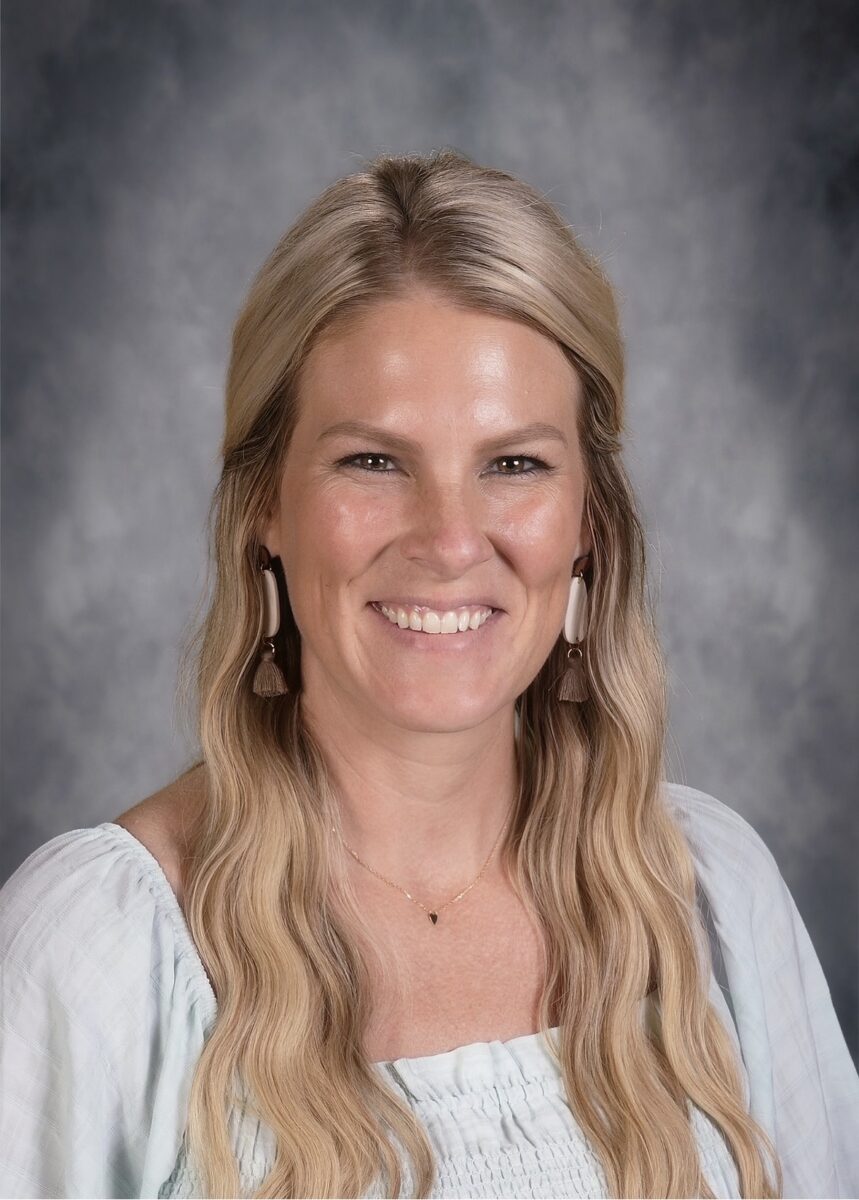
Tools for tiny hearts: The power of art and stories in dealing with big emotions
Adler Alumni authored books to help children understand and digest their emotions.

From pasture to practice: Adler students tap into animal-assisted therapy
Incorporating animals as a therapeutic toolbox is known to create physiological changes in clients, including increase in oxytocin for a calming effect, increase in endorphins for pleasure effect, and increase in dopamine which causes the reward center effect.

Adler University awards seed grants in support of four faculty-led research projects
“This award highlights the innovation and scholarly contributions of our faculty, whose work advances knowledge for educators and mental health practitioners,” said Cheryl R. Richardson, Ph.D., associate vice president of Faculty Affairs.
CACREP accreditation
Our distinctive practitioner-focused program is accredited by the Council for Accreditation of Counseling & Related Educational Programs (CACREP), which recognizes programs that meet or exceed the highest standards for counselor preparation.
Adler University is a nationally recognized pioneer in graduate education, training clinicians who work to build and maintain bridges across social, economic, cultural, racial, and political systems through their practice. Our learning environment is collaborative and community-oriented, bringing together rigorous coursework with real-world experience.
Still wondering?
Do you want to know more about Adler University before applying? Learn more about the University, explore programs, view admissions requirements, and review available scholarships.

